1922 White Paper
Arab riots of 1921-1920
St. James Conference (1939)
British Palestine Mandate for Israel:
British White Papers
Palestine Mandate: Table of Contents | History & Overview | Timeline of British Rule
White Papers - official reports by a British Government commission - were usually issued following government investigative commissions.
Famous White Papers issued during the British Mandate were in 1922, 1930 & 1939.
1922 White Paper
The first official manifesto interpreting the Balfour Declaration, it was issued on June 3, 1922, after the Haycraft Commission of Inquiry published its findings on the Arab riots of 1921. Although the White Paper stated that the Balfour Declaration could not be amended and that the Jews were in Palestine by right, it reduced the area of the Mandate by excluding the area east of the Jordan River, which was given to the Emir Abdullah. This document also established the principle of "economic absorptive capacity" as a factor for determining the immigration quota of Jews to Palestine.1930 "Passfield" White Paper
Issued on October 21, 1930, following the release of the Shaw Commission findings on the cause of the Arab riots of 1929. The document built off the findings of the Hope-Simpson Report which investigated the possibilities for future immigration to Palestine. The paper stated that because of the shortage of arable land, Jewish settlement would be permitted only under stringent government supervision. On February 13, 1931, British Prime Minister Ramsay MacDonald sent a letter to Dr. Weizmann in an attempt to calm tensions by slightly easing these provisions.1939 White Paper
Issued on May 17, 1939, it rejected the Peel Commission's partition plan on the grounds that it was not feasible. The document stated that Palestine would be neither a Jewish state nor an Arab one, but an independent state to be established within ten years. Jewish immigration to Palestine was limited to 75,000 for the first five years, subject to the country's "economic absorptive capacity", and would later be contingent on Arab consent. Stringent restrictions were imposed on land acquisition by Jews. The Jewish Agency for Palestine issued a scathing response to the White Paper, saying the British were denying the Jewish people their rights in "darkest hour of Jewish history.British White Papers:
Churchill White Paper(June 3, 1922)
White Papers: Table of Contents | Passfield Paper (1930) | 1939 Paper
The Secretary of State for the Colonies has given renewed consideration to the existing political situation in Palestine, with a very earnest desire to arrive at a settlement of the outstanding questions which have given rise to uncertainty and unrest among certain sections of the population. After consultation with the High Commissioner for Palestine [Sir Herbert Samuel] the following statement has been drawn up. It summarizes the essential parts of the correspondence that has already taken place between the Secretary of State and a delegation from the Moslem Christian Society of Palestine, which has been for some time in England, and it states the further conclusions which have since been reached.
The tension which has prevailed from time to time in Palestine is mainly due to apprehensions, which are entertained both by sections of the Arab and by sections of the Jewish population. These apprehensions, so far as the Arabs are concerned are partly based upon exaggerated interpretations of the meaning of the [Balfour] Declaration favouring the establishment of a Jewish National Home in Palestine, made on behalf of His Majesty's Government on 2nd November, 1917.Unauthorized statements have been made to the effect that the purpose in view is to create a wholly Jewish Palestine. Phrases have been used such as that Palestine is to become "as Jewish as England is English." His Majesty's Government regard any such expectation as impracticable and have no such aim in view. Nor have they at any time contemplated, as appears to be feared by the Arab delegation, the disappearance or the subordination of the Arabic population, language, or culture in Palestine. They would draw attention to the fact that the terms of the Declaration referred to do not contemplate that Palestine as a whole should be converted into a Jewish National Home, but that such a Home should be founded `in Palestine.' In this connection it has been observed with satisfaction that at a meeting of the Zionist Congress, the supreme governing body of the Zionist Organization, held at Carlsbad in September 1921, a resolution was passed expressing as the official statement of Zionist aims "the determination of the Jewish people to live with the Arab people on terms of unity and mutual respect, and together with them to make the common home into a flourishing community, the upbuilding of which may assure to each of its peoples an undisturbed national development."It is also necessary to point out that the Zionist Commission in Palestine, now termed the Palestine Zionist Executive, has not desired to possess, and does not possess, any share in the general administration of the country. Nor does the special position assigned to the Zionist Organization in Article IV of the Draft Mandate for Palestine imply any such functions. That special position relates to the measures to be taken in Palestine affecting the Jewish population, and contemplates that the organization may assist in the general development of the country, but does not entitle it to share in any degree in its government.Further, it is contemplated that the status of all citizens of Palestine in the eyes of the law shall be Palestinian, and it has never been intended that they, or any section of them, should possess any other juridical status. So far as the Jewish population of Palestine are concerned it appears that some among them are apprehensive that His Majesty's Government may depart from the policy embodied in the Declaration of 1917. It is necessary, therefore, once more to affirm that these fears are unfounded, and that that Declaration, reaffirmed by the Conference of the Principle Allied Powers at San Remo and again in the Treaty of Sevres, is not susceptible of change.During the last two or three generations the Jews have recreated in Palestine a community, now numbering 80,000, of whom about one fourth are farmers or workers upon the land. This community has its own political organs; an elected assembly for the direction of its domestic concerns; elected councils in the towns; and an organization for the control of its schools. It has its elected Chief Rabbinate and Rabbinical Council for the direction of its religious affairs. Its business is conducted in Hebrew as a vernacular language, and a Hebrew Press serves its needs. It has its distinctive intellectual life and displays considerable economic activity. This community, then, with its town and country population, its political, religious, and social organizations, its own language, its own customs, its own life, has in fact "national" characteristics. When it is asked what is meant by the development of the Jewish National Home in Palestine, it may be answered that it is not the imposition of a Jewish nationality upon the inhabitants of Palestine as a whole, but the further development of the existing Jewish community, with the assistance of Jews in other parts of the world, in order that it may become a centre in which the Jewish people as a whole may take, on grounds of religion and race, an interest and a pride. But in order that this community should have the best prospect of free development and provide a full opportunity for the Jewish people to display its capacities, it is essential that it should know that it is in Palestine as of right and not on the sufferance. That is the reason why it is necessary that the existence of a Jewish National Home in Palestine should be internationally guaranteed, and that it should be formally recognized to rest upon ancient historic connection.This, then, is the interpretation which His Majesty's Government place upon the Declaration of 1917, and, so understood, the Secretary of State is of opinion that it does not contain or imply anything which need cause either alarm to the Arab population of Palestine or disappointment to the Jews.For the fulfilment of this policy it is necessary that the Jewish community in Palestine should be able to increase its numbers by immigration. This immigration cannot be so great in volume as to exceed whatever may be the economic capacity of the country at the time to absorb new arrivals. It is essential to ensure that the immigrants should not be a burden upon the people of Palestine as a whole, and that they should not deprive any section of the present population of their employment. Hitherto the immigration has fulfilled these conditions. The number of immigrants since the British occupation has been about 25,000.It is necessary also to ensure that persons who are politically undesirable be excluded from Palestine, and every precaution has been and will be taken by the Administration to that end.It is intended that a special committee should be established in Palestine, consisting entirely of members of the new Legislative Council elected by the people, to confer with the administration upon matters relating to the regulation of immigration. Should any difference of opinion arise between this committee and the Administration, the matter will be referred to His Majesty's Government, who will give it special consideration. In addition, under Article 81 of the draft Palestine Order in Council, any religious community or considerable section of the population of Palestine will have a general right to appeal, through the High Commissioner and the Secretary of State, to the League of Nations on any matter on which they may consider that the terms of the Mandate are not being fulfilled by the Government of Palestine.With reference to the Constitution which it is now intended to establish in Palestine, the draft of which has already been published, it is desirable to make certain points clear. In the first place, it is not the case, as has been represented by the Arab Delegation, that during the war His Majesty's Government gave an undertaking that an independent national government should be at once established in Palestine. This representation mainly rests upon a letter dated the 24th October, 1915, from Sir Henry McMahon, then His Majesty's High Commissioner in Egypt, to the Sharif of Mecca, now King Hussein of the Kingdom of the Hejaz. That letter is quoted as conveying the promise to the Sherif of Mecca to recognise and support the independence of the Arabs within the territories proposed by him. But this promise was given subject to a reservation made in the same letter, which excluded from its scope, among other territories, the portions of Syria lying to the west of the District of Damascus. This reservation has always been regarded by His Majesty's Government as covering the vilayet of Beirut and the independent Sanjak of Jerusalem. The whole of Palestine west of the Jordan was thus excluded from Sir. Henry McMahon's pledge.Nevertheless, it is the intention of His Majesty's Government to foster the establishment of a full measure of self government in Palestine. But they are of the opinion that, in the special circumstances of that country, this should be accomplished by gradual stages and not suddenly. The first step was taken when, on the institution of a Civil Administration, the nominated Advisory Council, which now exists, was established. It was stated at the time by the High Commissioner that this was the first step in the development of self-governing institutions, and it is now proposed to take a second step by the establishment of a Legislative Council containing a large proportion of members elected on a wide franchise. It was proposed in the published draft that three of the members of this Council should be non official persons nominated by the High Commissioner, but representations having been made in opposition to this provision, based on cogent considerations, the Secretary of State is prepared to omit it. The legislative Council would then consist of the High Commissioner as President and twelve elected and ten official members. The Secretary of State is of the opinion that before a further measure of self government is extended to Palestine and the Assembly placed in control over the Executive, it would be wise to allow some time to elapse. During this period the institutions of the country will have become well established; its financial credit will be based on firm foundations, and the Palestinian officials will have been enabled to gain experience of sound methods of government. After a few years the situation will be again reviewed, and if the experience of the working of the constitution now to be established so warranted, a larger share of authority would then be extended to the elected representatives of the people.The Secretary of State would point out that already the present administration has transferred to a Supreme Council elected by the Moslem community of Palestine the entire control of Moslem Religious endowments (Waqfs), and of the Moslem religious Courts. To this Council the Administration has also voluntarily restored considerable revenues derived from ancient endowments which have been sequestrated by the Turkish Government. The Education Department is also advised by a committee representative of all sections of the population, and the Department of Commerce and Industry has the benefit of the co operation of the Chambers of Commerce which have been established in the principal centres. It is the intention of the Administration to associate in an increased degree similar representative committees with the various Departments of the Government.The Secretary of State believes that a policy upon these lines, coupled with the maintenance of the fullest religious liberty in Palestine and with scrupulous regard for the rights of each community with reference to its Holy Places, cannot but commend itself to the various sections of the population, and that upon this basis may be built up that a spirit of cooperation upon which the future progress and prosperity of the Holy Land must largely depend.
Sources: The Avalon Project
Pre-State Israel:
Photographs from 1929 Arab Riots
(August 1929)
Pre-State Israel: Table of Contents | Arab Riots of the 1920's | 1929 Hebron Massacre
The Arab riots that erupted in 1929 - also known as the Western Wall Riots - were the result of disputes between Muslims and Jews over access to the Western Wall in Jerusalem. Demonstrations escalated to weeks of riots and violence beginning in August of 1929.
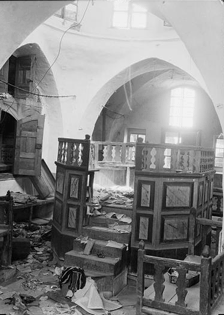
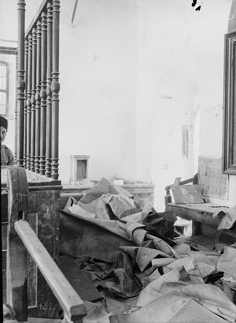
Synagogue (left, center) and Jewish home (right) desecrated and plundered by Arab rioters in Hebron.
A large Torah scroll can be seen in a jumbled heap on the floor in the middle picture.
Jewish colony of Artuf set on fire by Arabs.
An Arab "protest gathering" in session. In the Rawdat el Maaref hall.
Mosque desecrated through Jewish retaliation. The Awkashi mosque near a Jewish quarter of Jerusalem.
Desecrated graves in the Awkashi shrine. Demolished by Jews [Jerusalem].
Jewish families fleeing from the Old City with bag and baggage at Jaffa Gate, Jerusalem.
British troops at Jaffa Gate on guard during outbreak with steel helmets and fixed bayonets.
Display of military force in Jerusalem. Troops in full kit marching through the streets.
His Eminence the Grand Mufti of Jerusalem. Haj Amin Effendi el-Husseini.
Sources: Library of Congress
Pre-State Israel:
The Passfield White Paper
(1930)
Pre-State Israel: Table of Contents | Palestinian Arabs | Peace Efforts
The Passfield White Paper, issued by the colonel secretary Lord Passfield (Sidney Webb), was a formal statement of British policy in Palestine made in the aftermath of the 1929 riots. The Hope-Simpson Report had recommended that such a statement be made, in the hopes of clarifying unresolved questions concerning the British Mandate for Palestine and the Balfour Declaration. The paper was issued in October, 1930, and like the Hope-Simpson Report, was considered very favorable for the Arabs.
Contrary to Zionist claims, the White Paper stated that the development of a Jewish National Home in Palestine was not considered central to the mandate. However, the paper claims that the British did intend to fulfill their obligations to both Arabs and Jews, and would resolve any conflicts that might surface as a result of their respective needs.
Although not considered central to the mandate, the White Paper did commit the British to continuing their support for a Jewish National Home in Palestine. The paper's tone, however, was decidedly anti-Jewish. Several Jewish institutions were severely criticized, among them the Histadrut (General Federation of Labor) and the Jewish Agency. Both the Histadrut and the Jewish Agency promoted Jewish employment of only Jewish labor. Like the Hope-Simpson Report, the Passfield White Paper found this policy damaging to the economic development of the Arab population.
The White Paper also devoted some attention to the issue of agricultural development. According to the paper, there was simply not enough cultivable land to support new immigrants. Jews who had purchased considerable tracts of land would be allowed to develop them, but would thereafter need to secure permission of the British authorities before acquiring additional land. When determining whether or not to grant a particular request for land, the British would look at unemployment levels of both Arabs and Jews.
As a result of the Passfield White Paper, Jewish immigration was limited to a much greater degree. Vigorous protests on the part of Jewish organizations worldwide and British opponents of the paper led to yet another clarification of British policy as formulated in the MacDonald Letter. In it, Prime Minister Ramsay MacDonald wrote to Chaim Weizmann that he would encourage further settlement while at the same time safeguard the interests of other groups in Palestine.
PALESTINE
Statement of Policy
by His Majesty's Government
in the United Kingdom
Presented by the Secretary of State for the Colonies
to Parliament by Command of His Majesty,
October 1930
LONDON:
PRINTED AND PUBLISHED BY HIS MAJESTY'S STATIONERY OFFICE
To be purchased directly from H.M. STATIONERY OFFICE at the following addresses:
Adastral House, Kingsway, London, W.C.z; 120, George Street, Edinburgh;
York Street, Manchester; i, St. Andrew's Crescent, Cardiff;
15, Donegall Square West, Belfast;
or through any Bookseller.
1930
Price 46. NetCmd. 3692PALESTINE.
Statement of Policy by His Majesty's Government in the United Kingdom.1. THE Report* of the Special Commission, under the Chairmanship of Sir Walter Shaw, which was published in April, gave rise to acute controversy, in the course of which it became evident that there is considerable misunderstanding about the past actions and future intentions of His Majesty's Government in the United Kingdom in regard to the administration of Palestine. It was realised that the publication of a clear and full statement of policy, designed to remove such misunderstanding and the resultant uncertainty and apprehension, was a matter of urgent importance. The preparation of such a statement, however, necessitated certain essential preliminary steps which have inevitably delayed its completion.The Report of the Shaw Commission drew attention to certain features of the problem, which, in the opinion of His Majesty's Government, called for prompt and full investigation, in view of their important bearing upon future policy. It was therefore decided to send to Palestine a highly qualified investigator (Sir John Hope Simpson) to confer with the High Commissioner and to report to His Majesty's Government on land settlement, immigration and development. Owing to the dominating importance of these subjects, and their close inter-connection, His Majesty's Government recognised that no statement of policy could be formulated without first taking into account a full and detailed exposition of the situation in Palestine under these three important heads, such as Sir John Hope Simpson was eminently qualified to furnish. Considerable pressure has been brought to bear upon His Majesty's Government to anticipate the receipt of Sir John Hope Simpson's Report by a declaration of policy, but, while appreciating the urgent need for as early a declaration as possible. His Majesty's Government felt bound to adhere to their decision to await the receipt of Sir John Hope Simpson's Report, especially having regard to the evidence which was accumulating as to the extreme difficulty and complexity of the problem and the need for the fullest investigation of the facts before arriving at any definite conclusions.Sir John Hope Simpson's Report* has now been received, and the present statement of policy has been framed after very careful consideration of its contents and of other information bearing upon the Palestine situation which has recently become available.
* Cmd. 3530. *Cmd. 36
21671 9/30 F.O.P
Wt. —— 3000 10/30 218332. In a country such as Palestine, where the interests and aims of two sections of the community are at present diverse and in some respects conflicting, it is too much to expect that any declaration of policy will fully satisfy the aspirations of either party. His Majesty's Government have, however, permitted them-selves to hope that the removal of existing misunderstandings and the more precise definition of their intentions may go far to allay uneasiness and to restore confidence on both sides. It will be the endeavour of His Majesty's Government, not only by the present statement of policy but by the administrative actions which will result from it, to convince both Arabs and Jews of their firm intention to promote the essential interests of both races to the utmost of their power, and to work consistently for the development, in Palestine, of a prosperous community, living' in peace under an impartial and progressive Administration. It is necessary, however, to emphasise one important point, viz., that in the peculiar circumstances of Palestine no policy, however enlightened or however vigorously prosecuted, can hope for success, unless it is supported not merely by the acceptance, but by the willing co-operation of the communities for whose benefit it is designed.It is unnecessary here to dwell upon the unhappy events of the past year and the deplorable conditions which have resulted from them. His Majesty's Government feel bound, however, to remark that they have received little assistance from either side in healing the breach between them during the months of tension and unrest which have followed on the disturbances of August 1929, and that to the difficulties created by the mutual suspicions and hostilities of the two races has been added a further grave obstacle, namely, an attitude of mistrust towards His Majesty's Government fostered by a press campaign in which the true facts of the situation have become obscured and distorted. It cannot be too strongly emphasised that on the establishment of better relations between Arabs and Jews depend the future peace and prosperity of the country which is dear to both races. This is the object which His Majesty's Government have constantly in view, and they feel that it is more likely to be attained if both sides will willingly co-operate with the Government and with the Palestine Administration, and endeavour to realise that, in the discharge of their mandatory obligations and indeed in all their relations with Palestine, His Majesty's Government may be trusted to safe-guard and promote the interests of both races.3. Many of the misunderstandings which have unhappily arisen on both sides appear to be the result of a failure to appreciate the nature of the duty imposed upon His Majesty's Government by the terms of the Mandate. The next point, therefore, which His Majesty's Government feel it necessary to emphasise, in the strongest manner possible, is that in the words of the Prime Minister's statement in the House of Commons on the 3rd April last, "a double undertaking is involved, to the Jewish people on the one hand and to the non-Jewish population of Palestine on the other."Much of the agitation which has taken place during the past year seems to have arisen from a failure to realise the full import of this fundamental fact. Both Arabs and Jews have assailed the Government with demands and reproaches based upon the false assumption that it was the duty of His Majesty's Government to execute policies from which they are, in fact, debarred by the explicit terms of the Mandate.The Prime Minister, in the statement above referred to, announced, in words which could not have been made more plain, that it is the intention of His Majesty's Government to continue to administer Palestine in accordance with the terms of the Mandate, as approved by the Council of the League of Nations. " That " said Mr. Ramsay MacDonald, " is an international obligation from which there can be no question of receding." In spite of so unequivocal a statement, the hope seems to have been entertained that, by some means or other, an escape could be found from the limitations plainly imposed by the terms of the Mandate. It must be realised, once and for all, that it is useless for Jewish leaders on the one hand to press His Majesty's Government to conform their policy in regard, for example, to immigration and land, to the aspirations of the more uncompromising sections of Zionist opinion. That would be to ignore the equally important duty of the Mandatory Power towards the non-Jewish inhabitants of Palestine. On the other hand, it is equally useless for Arab leaders to maintain their demands for a form of Constitution, which would render it impossible for His Majesty's Government to carry out, in the fullest sense, the double undertaking already referred to. His Majesty's Government have reason to think that one of the reasons for the sustained tension and agitation on both sides has been the creation by misguided advisers of the false hope that efforts to intimidate and to bring pressure to bear upon His Majesty's Government would eventually result in forcing them into a policy which weighted the balances in favour of the one or the other party.It becomes, therefore, essential that at the outset His Majesty's Government should make it clear that they will not be moved, by any pressure or threats, from the path laid down in the Mandate, and from the pursuit of a policy which aims at promoting the interests of the inhabitants of Palestine, both Arabs and Jews, in a manner which shall be consistent with the obligations which the Mandate imposes.4. This is not the first time that His Majesty's Government have endeavoured to make clear the nature of their policy in Palestine. In 1922 a full statement was published* and was communicated both to the Palestine Arab Delegation, then in London, and to the Zionist Organisation. This statement met with no acceptance on the part of the Arab Delegation, but the Executive of the Zionist Organisation passed a Resolution assuring His Majesty's Government that the activities of the Organisation would be conducted in conformity with the policy therein set forth. Moreover, in the letter conveying the text of this Resolution to His Majesty's Government, Dr. Weizmann wrote:—* Cmd. 1700. B 2[21833]
" The Zionist Organisation has, at all time, been sincerely desirous of proceeding in harmonious co-operation with all sections of the people of Palestine. It has repeatedly made it clear, both in word and deed, that nothing is further from its purpose than to prejudice in the smallest degree the civil or religious rights, or the material interests of the non-Jewish population."
The experience of the intervening years has inevitably brought to light certain administrative defects and special economic problems, which have to be taken into account in considering the welfare of all sections of the community. Nevertheless, the statement of policy, issued after prolonged and careful consideration in 1922, provides the foundations upon which future British policy in Palestine must be built up.5. Apart from proposals for the establishment of a Constitution in Palestine which will be dealt with in later paragraphs, there are three important points dealt with in this statement which must now be recalled :—(a) The meaning attached by His Majesty's Government to the expression " the Jewish National Home," which is contained in the Mandate.On this point, the following passage may be quoted from the 1922 Statement:—
" During the last two or three generations the Jews have recreated in Palestine a community, now numbering 80,000, of whom about one-fourth are farmers or workers upon the land. This community has its own political organs; an elected assembly for the direction of its domestic concerns; elected councils in the towns; and an organisation for the control of its schools. It has its elected Chief Rabbinate and Rabbinical Council for the direction of its religious affairs. Its business is conducted in Hebrew as a vernacular language and a Hebrew press serves its needs. It has its distinctive intellectual life and displays considerable economic activity. This community, then, with its town and country population, its political, religious and social organisation, its own language, its own customs, its own life, has in fact "national" characteristics. When it is asked what is meant by the development of the Jewish National Home in Palestine, it may be answered that it is not the imposition of a Jewish nationality upon the inhabitants of Palestine as a whole, but the further development of the existing Jewish community, with the assistance of Jews in other parts of the world, in order that it may become a centre in which the Jewish people as a whole may take, on grounds of religion and race, an interest and a pride. But in order that this community should have the best prospect of free development and provide a full opportunity for the Jewish| people to display its capacities, it is essential that it should knowthat it is in Palestine as of right and not on sufferance. That is the reason why it is necessary that the existence of a JewishNational Home in Palestine should be internationally guaranteed, and that it should be formally recognised to rest upon ancient historic connection."This, then, is the interpretation which His Majesty's Government place upon the Declaration of 1917, and, so understood, the Secretary of State is of opinion that it does not contain or imply anything which need cause either alarm to the Arab population of Palestine or disappointment to the Jews."
(b) The principles which should govern immigration.On this point the statement of policy continues as follows :—'' For the fulfilment of this policy it is necessary that the Jewish community in Palestine should be able to increase its numbers by immigration. This immigration cannot be so great in volume as to exceed whatever may be the economic capacity of the country at the time to absorb new arrivals. It is essential to ensure that the immigrants should not be a burden upon the people of Palestine as a whole, and that they should not deprive any section of the present population of their employment. Hitherto the immigration has fulfilled these conditions. The number of immigrants since the British occupation has been about 25,000."It is necessary also to ensure that persons who are politically undesirable are excluded from Palestine and every precaution has been and will be taken by the Administration to that end."It will be observed that the principles enunciated above render it essential that in estimating the absorptive capacity of Palestine at any time account should be taken of Arab as well as Jewish unemployment in determining the rate at which immigration should be permitted. It is the intention of His Majesty's Government to take steps to ensure a more exact application of these principles in the future.
(c) The position of the Jewish Agency.In the passage quoted below, an attempt was made to indicate the limitations, implicit in the Mandate, necessarily imposed upon the scope of the Jewish Agency provided for in Article 4 of the Mandate:—"It is also necessary to point out that the Zionist Commission in Palestine, now termed the Palestine Zionist Executive, has not desired to possess, and does not possess, any share in the general administration of the country. Nor does the special position assigned to the Zionist Organisation in Article IV of the draft Mandate for Palestine imply any such functions. That special position relates to the measures affecting the Jewish population, and contemplates that the Organisation may assist in the general development of the country, but does not entitle it to share in any degree in its Government."
[21833] B 86. His Majesty's Government desire to reaffirm generally the policy outlined in the 1922 Statement, and, in particular, the three passages quoted above. On these three important points it is not thought that anything but barren controversy would result from an attempt further to elaborate their conceptions. It is recognised, however, in the light of past experience that much remains to be done to improve the practical application of the principles enunciated in the foregoing passages, and it is the intention of the Government, in consultation with the Palestine Administration, to take active steps to provide improved machinery for meeting the requirements of both Arabs and Jews, under these three heads. In particular, it is recognised as of the greatest importance that the efforts of the High Commissioner towards some closer and more harmonious form of co-operation and means of consultation between the Palestine Administration and the Jewish Agency should be further developed, always consistently, however, with the principle which must be regarded as basic, that the special position of the Agency, in affording advice and co-operation, does not entitle the Agency, as such, to share in the government of the country. Similarly, machinery must be provided to ensure that the essential interests of the non-Jewish sections of the Community should at the same time be fully safe-guarded, and that adequate opportunity should be afforded for consultation with the Palestine Administration on matters affecting those interests.7. At this point it becomes desirable to remove any ground of misunderstanding that may exist as to the passages in the Mandate bearing upon the safeguarding of the rights of the non-Jewish community in Palestine. The passages in the Mandate specially bearing on this point will be found in—Article 2. " The Mandatory shall be responsible for placing the country under such political administrative and economic conditions as will secure the establishment of the Jewish National Home, as laid down in the preamble, and the development of self-governing institutions, and also for safeguarding the civil and religious rights of all the inhabitants of Palestine, irrespective of race and religion."Article 6. " The Administration of Palestine, while ensuring that the rights and position of other sections of the population are not prejudiced, shall facilitate Jewish immigration under suitable conditions, and shall encourage, in co-operation with the Jewish agency referred to in Article 4, close settlement by Jews on the land, including State lands and waste lands not required for public purposes."Article 9. "The Mandatory shall be responsible for seeing that the judicial system established in Palestine shall assure to foreigners, as well as to natives, a complete guarantee of their rights.Respect for personal status of the various peoples and communities and for their religious interests shall be fully guaranteed. In particular, the control and administration of Wakfs shall be exercised in accordance with religious law and the dispositions of the founders."Article 18. " All responsibility in connection with the Holy Places and religious buildings or sites in Palestine, including that of preserving existing rights and of securing free access to the Holy Places, religious buildings and sites, and the free exercise of worship, while ensuring the requirements of public order and decorum, is assumed by the Mandatory, who shall be responsible solely to the League of Nations in all matters connected here-with, provided that nothing in this article shall prevent the Mandatory from entering into such arrangements as he may deem reasonable with the Administration for the purpose of carrying the provisions of this article into effect, and provided also that nothing in this Mandate shall be construed as conferring upon the Mandatory authority to interfere with the fabric or the management of purely Moslem sacred shrines, the immunities of which are guaranteed."Article 15. " The Mandatory shall see that complete freedom of conscience and the free exercise of all forms of worship, subject only to the maintenance of public order and morals, are ensured to all. No discrimination of any kind shall be made between the inhabitants of Palestine on the ground of race, religion or language. No person shall be excluded from Palestine on the sole ground of his religious belief.The right of each community to maintain its own schools for the education of its own members in its own language, while conforming to such educational requirements of a general nature as the Administration may impose, shall not be denied or impaired."On the other hand, special reference to the Jewish National Home and to Jewish interests are contained inArticle 4 :—Article 4. " An appropriate Jewish agency shall be recognised as a public body for the purpose of advising and co-operating with the Administration of Palestine in such economic, social and other matters as may affect the establishment of the Jewish National Home and the interests of the Jewish population in Palestine, and, subject always to the control of the Administration, to assist and take part in the development of the country.The Zionist organisation, so long as its organisation and constitution are in the opinion of the Mandatory appropriate, shall be recognised as such agency. It shall take steps in consultation with His Britannic Majesty's Government to secure the cooperation of all Jews who are willing to assist in the establishment of the Jewish National Home."
Article 6. (Already quoted above.)
Article 11. "The Administration of Palestine shall take all necessary measures to safeguard the interests of the community in connection with the development of the country, and, subject to any international obligations accepted by the mandatory, shall have full power to provide for public ownership or control of any of the natural resources of the country or of the public works, services and utilities established or to be established therein. It shall introduce a land system appropriate to the needs of the country, having regard, among other things, to the desirability of promoting the close settlement and intensive cultivation of the land.The Administration may arrange with the Jewish Agency mentioned in Article 4 to construct or operate, upon fair and equitable terms, any public works, services and utilities, and to develop any of the natural resources of the country, in so far as these matters are not directly undertaken by the Administration. Any such arrangements shall provide that no profits distributed by such agency directly or indirectly, shall exceed a reasonable rate of interest on the capital, and any further profits shall be utilised by it for the benefit of the country in a manner approved by the Administration."8. In the first place, it will be observed that Article 2 makes the Mandatory responsible for safeguarding the civil and religious rights of all the inhabitants of Palestine, irrespective of race or religion; and secondly, that the obligation contained in Article 6 to facilitate Jewish immigration and to encourage close settlement by Jews on the land, is qualified by the requirement to ensure that the rights and position of other sections of the population are not prejudiced. Moreover, by Article 11 "the Administration of Palestine is required to take all necessary measures to safeguard the interests of the community in connection with the development of the country." It is clear from the wording of this Article that the population of Palestine as a whole, and not any sectional interest, is to be the object of the Government's care, and it may be noted that the provision for arranging with the Jewish Agency for the construction or operation of public works, services and utilities, is only permissive and not obligatory, and could not be allowed to conflict with the general interests of the community. These points are emphasised because claims have been made on behalf of the Jewish Agency to a position in regard to the general administration of the country, which His Majesty's Government cannot but regard as going far beyond the clear intention of the Mandate. Moreover, attempts have been made to argue, in support of Zionist claims, that the principal feature of the Mandate is the regarding the Jewish National Home, and that the passages designed to safeguard the rights of the non-Jewish community are merely secondary considerations qualifying, to some extent, what is claimed to be the primary object for which the Mandate has been framed.This is a conception which His Majesty's Government have always regarded as totally erroneous. However difficult the task may be it would, in their view, be impossible, consistently with the plain intention of the Mandate, to attempt to solve the problem by subordinating one of these obligations to the other. The British Accredited Representative, when appearing before the Permanent Mandates Commission on the 9th of June last, endeavoured to make clear the attitude of His Majesty's Government towards the difficulties inherent in the Mandate. In commenting on his statements in their report to the Council, the Permanent Mandates Commission made the following important pronouncement:—
"From all these statements two assertions emerge, which should be emphasised :—
(1) that the obligations laid down by the Mandate in regard to the two sections of the population are of equal weight;(2) that the two obligations imposed on the Mandatory are in no sense irreconcilable."
'' The Mandates Commission has no objection to raise to these two assertions, which, in its view, accurately express what it conceives to be the essence of the Mandate for Palestine and ensure its future."
His Majesty's Government are fully in accord with the sense of this pronouncement and it is a source of satisfaction to them that it has been rendered authoritative by the approval of the Council of the League of Nations.It is the difficult and delicate task of His Majesty's Government to devise means whereby, in the execution of its policy in Palestine, equal weight shall at all times be given to the obligations laid down with regard to the two sections of the population and to reconcile those two obligations where, inevitably, conflicting interests are involved.It is hoped that the foregoing explanation of the nature of the task imposed by the Mandate upon His Majesty's Government will make clear the necessity, already emphasised, for willing co-operation with the Palestine Administration and with His Majesty's Government on the part both of Arab and Jewish leaders.9. The preceding paragraphs contain an exposition of the general principles which have to be taken into account as governing policy in Palestine and the limiting conditions under which it must be carried out. The practical problems with which His Majesty's Government are faced in Palestine must now be considered in detail.
These may be regarded as falling roughly under three heads :—
(1) Security,(2) Constitutional development,(8) Economic and Social development.
They will be dealt with in that order.
(1) Security.10. It it a primary duty of the Administration to ensure peace, order and good government in Palestine. In an earlier paragraph His Majesty's Government have intimated that they will not be moved from their duty by any pressure or threats.Outbreaks of disorder in the past have been promptly repressed and special measures have been taken to deal with any future emergencies. It must be clearly understood that incitements to disorder or disaffection, in whatever quarter they may originate, will be severely punished and the powers of the Administration will, so far as may be necessary, be enlarged to enable it to deal the more effectively with any such dangerous and unwarrantable attempts.His Majesty's Government have decided to retain in Palestine, for the present, two battalions of infantry; in addition to these, two squadrons of air craft and four sections of armoured cars will be available in Palestine and Trans-Jordan. It will be recalled that Mr. Dowbiggin, Inspector-General of Police, Ceylon, was sent to Palestine to enquire into the organisation of the Palestine Police Force. His elaborate and valuable report has been received and is under detailed consideration. Certain of his recommendations have already been carried out, including those involving an increase in the strength of the British and Palestinian sections of the Force and those providing for a scheme of defence for Jewish Colonies, to which reference was made in paragraph 9 of the statement with regard to British Policy in Palestine, published as Command Paper 8582. The remainder of the many recommendations in Mr. Dowbiggin's report are under consideration in consultation with the High Commissioner for Palestine, and further changes will be made when decisions are taken on these recommendations ^ His Majesty's Government avail themselves of this opportunity to reiterate their determination to take all possible steps to suppress crime and maintain order in Palestine. They desire to emphasise, in this connexion, that in determining the nature and composition of the security forces necessary for this purpose they must be guided by their expert advisers, and must aim at ensuring that the forces employed are suitable for the duties which they have to carry out, without regard to any political considerations.
(2) Constitutional Development. 11. Reference has already been made to the demands of Arab leaders for a form of constitution which would be incompatible with the mandatory obligations of His Majesty's Government. It is, however, the considered opinion of His Majesty's Government that the time has now come when the important question of the establishment of a measure of self-government in Palestine must, in the interests of the community as a whole, be taken in hand without further delay.It may be convenient, in the first instance, to give a brief resume of the history of this question since the establishment of the civil administration.In October 1920 there was set up in Palestine an Advisory Council composed in equal parts of official and nominated unofficial members. Of the ten unofficial members, four were Moslems, three were Christians and three were Jews.On the 1st September, 1922, the Palestine Order in Council was issued, setting up a Government in Palestine under the Foreign Jurisdiction Act. Part 3 of the Order in Council directed the establishment of a Legislative Council to be composed of the High Commissioner as President, with ten other official members, and 12 elected non-official members. The procedure for the selection of the non-official members was laid down in the Legislative Council, Order in Council, 1922, and in February and March 1928 an attempt was made to hold elections in accordance with that procedure.The attempt failed owing to the refusal of the Arab population as a whole to co-operate (a detailed report of these elections is contained in the papers relating to the elections for the Palestine Legislative Council, 1928, published as Command Paper 1889).The High Commissioner thereupon suspended the establishment of the proposed Legislative Council, and continued to act in consultation with an Advisory Council as before.Two further opportunities were given to representative Arab leaders in Palestine to co-operate with the Administration in the government of the country, first, by the reconstitution of a nominated Advisory Council, but with membership conforming to that proposed for the Legislative Council, and, secondly, by a proposal for the formation of an Arab agency. It was intended that this Agency should have functions analogous to those entrusted to the Jewish Agency by Article 4 of the Palestine Mandate.Neither of these opportunities was accepted and, accordingly, in December 1928, an Advisory Council was set up consisting only of official members. This position still continues; the only change being that the Advisory Council has been enlarged by the addition of more official members as the Administration developed.It will be recalled that, under the terms of Article 2 of the Mandate, His Majesty's Government are responsible for placing the country under such political, administrative and economic conditions as will secure the establishment of the Jewish National Home and the development of self-governing institutions, and for safeguarding the civil and religious rights of the inhabitants. The action taken with regard to constitutional development in the early years of the Civil Administration is briefly described above.With the object of enabling the people of Palestine to obtain practical experience of administrative methods and the business of government and to learn discrimination in the selection of their representatives, Lord Plumer, who was High Commissioner for Palestine from 1925 to 1928, introduced a wider measure of local self-government than had previously obtained under the British regime.Sir John Chancellor considered the question of constitutional development on his assumption of the office of High Commissioner in December 1928. He consulted representatives of various local interests and, after a careful examination of the position, put forward certain proposals in June 1929. Discussion of the question was, however, suspended in consequence of the disturbances in August 1929.12. His Majesty's Government have now carefully considered of this question in the light of the present stage of progress and development and with special regard to their obligation to place the country under such political, administrative and economic / conditions as will secure the development of self-governing institutions. They have decided that the time has arrived for a further step in the direction of the grant to the people of Palestine, of a measure of self-government compatible with the terms of the Mandate.His Majesty's Government accordingly intend to set up a Legislative Council generally on the lines indicated in the statement of British policy in Palestine issued by Mr. Churchill in June 1922, which is reproduced as Appendix 5 to the Report of the Commission on the Palestine disturbances of August 1929.His Majesty's Government trust that on this occasion they will secure the co-operation of all sections of the population of Palestine. His Majesty's Government desire to make it quite clear that while they would deeply regret an attempt on the part of any section of the population to prevent them from giving effect to their decision, all possible steps will be taken to circumvent such an attempt, if made, since they consider it in the interests of the population of the country as a whole that the further step now proposed should no longer be deferred.His Majesty's Government would point out that had this Legislature been set up at the time when it was first contemplated the people of Palestine would by now have gained more experience of the working of constitutional machinery. Such experience is indispensable for any progress in constitutional development. The sooner all sections of the population show a desire to co-operate with His Majesty's Government in this respect, the sooner will it be possible for such constitutional development to take place as His Majesty's Government hope to see in Palestine.There are obvious advantages to be gained by all sections of the population from the establishment of such a Council. It should be of special benefit to the Arab section of the population, who do not at present possess any constitutional means for putting their views on social and economic matters before the Government. Their representatives on the Council which is to be set up will, of course, be in the position, not only to present the views of the Arab section of the population on these and other matters, but also to participate in discussions thereon. A further advantage may accrue to the country as a whole from the establishment of the Legislative Council, viz., that the participation of representatives of both sections of the community as members of the Legislative Council, will tend to improve the relations between the Jews and the Arabs.18. As stated above, the new Legislative Council will be on the lines indicated in the statement of policy issued in 1922. It will consist of the High Commissioner and 22 members, of whom ten will be official members and 12 unofficial members. Unofficial members of the Council will normally be elected by primary and secondary elections. It is, however, in the view of His Majesty's Government, so important to avoid the repetition of the deadlock which occurred in 1923 that steps will be devised to ensure the appointment of the requisite number of unofficial members to the Council in the event of one or more members failing to be elected on account of the non-co-operation of any section of the population, or for any other reason. The High Commissioner will continue to have the necessary power to ensure that the Mandatory shall be enabled to carry out its obligations to the League of Nations, including any legislation "urgently required, as well as the maintenance of order.When difference arises as to the fulfilment by the Government of Palestine of the terms of the Mandate, a petition to the League of Nations is admissible under Article 85 of the Order in Council of 1922.
(3) Economic and Social Development,14. Under this head the practical problems to be considered are mainly concerned with, questions relating to land, immigration and unemployment. These three questions are intimately interrelated, with political "as well as economic aspects, and upon their solution must depend any advance that can be hoped for towards settled conditions of peace and prosperity in Palestine.Since attention was drawn to these matters in the Report of the Shaw Commission, they have formed the subject of detailed investigations on the spot by a Committee appointed by the High Commissioner in April, to examine into the economic condition of agriculturists and the fiscal measures of Government in relation thereto, and also by Sir John Hope Simpson who, on instructions from the Secretary of State for the Colonies, proceeded to Palestine in May in order to examine the questions of immigration, land settlement and development.15. As a result of these extensive and elaborate investigations, certain conclusions have emerged and certain facts have been established which will now be set out briefly:—
(1) Land.
It can now be definitely stated that at the present time and with the present methods of Arab cultivation there remains no margin of land available for agricultural settlement by new immigrants, with the exception of such undeveloped land as the various Jewish agencies hold in reserve.There has been much criticism in the past in regard to the relatively small extent of State land which has been made available for Jewish settlement. It is, however, an error to imagine that the Palestine Government is in possession of large areas of vacant land which could be made available for Jewish settlement. The extent of unoccupied areas of Government land is negligible. The Government claims considerable areas which are, in fact, occupied and cultivated by Arabs. Even were the title of the Government to these areas admitted, and it is in many cases disputed, it would not be possible to make these areas available for Jewish settlement, in view of their actual occupation by Arab cultivators and of the importance of making available additional land on which to place the Arab cultivators who are now landless.The provision of a margin available for settlement depends upon the progress made in increasing the productivity of the land already occupied.16. It now appears, in the light of the best available estimates, that the area of cultivable land in Palestine (excluding the Beer-Sheba region) is 6,544,000 dunams. This area is considerably less than had hitherto been estimated, previous official estimates being in the neighbourhood of 10 to 11 million dunams.It also appears that while an area of at least 130 dunams is required to maintain a fellah family in a decent standard of life in the unirrigated tracts, the whole of the cultivable land in the country, excluding the area already in the hands of the Jews, would, were it divided among the existing Arab cultivators, provide an average holding of not more than 90 dunams. In order to provide an average holding of 130 dunams for all Arab cultivators, about 8 million dunams of cultivable land would be required.It also appears that of the 86,980 rural Arab families in the villages, 29-4 per cent, are landless. It is not known how many of these are families who previously cultivated and have since lost their land. This is one point, among others, upon which, at present, it is not possible to speak with greater precision, but which will, it is hoped, be ascertained in the course of the Census which is to be taken next year.17. The condition of the Arab fellah leaves much to be desired, and a policy of land development is called for if an improvement in his conditions of life is to be effected.The sole agencies which have pursued a consistent policy of land development have been the Jewish Colonisation organisations, public and private.The Jewish settlers have had every advantage that capital, science and organisation could give them. To these and to the energy of the settlers themselves their remarkable progress is due. On the other hand, the Arab population, while lacking the advantages enjoyed by the Jewish settlers, has, by the excess of births over deaths, increased with great rapidity, while the land available for its sustenance has decreased by about a million dunams. This area has passed into Jewish hands.18. Reference has been made to the energy evinced and the remarkable progress made in Jewish land settlement. It would be unjust to accept the contention, which has been advanced in the course of the controversy regarding relations between Jews and Arabs in Palestine, that the effect of Jewish settlement upon the Arab population has in all cases been detrimental to the interests of the Arabs. This is by no means wholly true, but it is necessary in considering this aspect of the problem to differentiate between colonisation by such bodies as the Palestine Jewish Colonisation Association (commonly known as the P.I.C.A.) and colonisation under Zionist auspices.In so far as the past policy of the P.I.C.A. is concerned, there can be no doubt that the Arab has profited largely by the installation of the Colonies, and relations between the colonists and their Arab neighbours have in the past been excellent. The cases which are now quoted by the Jewish authorities in support of the contention that the effect of Jewish colonisation on the Arabs in the neighbourhood has been advantageous, are cases relating to Colonies established by the P.I.C.A. before colonisation financed from the Palestine Foundation Fund, which is the main financial instrument of the Jewish Agency, came into existence.Some of the attempts which have been made to prove that Zionist colonisation has not had the effect of causing the previous tenants of land acquired to join the landless class have on examination proved to be unconvincing, if not fallacious.19. Moreover, the effect of Jewish colonisation on the existing population is very intimately affected by the conditions on which the various Jewish bodies hold, utilise and lease their land. It is provided by the Constitution of the Enlarged Jewish Agency, signed at Zurich on the 14th August, 1929 (Article 3 (d) and (e)},that the land acquired shall be held as the '' inalienable property of the Jewish people," and that in " all the works or undertakings carried out or furthered by the Agency, it shall be deemed to be a matter of principle that Jewish labour shall be employed." Moreover, by Article 23 of the draft lease, which it is proposed to execute in respect of all holdings granted by the Jewish National Fund, the lessee undertakes to execute all works connected with the cultivation of the holdings only with Jewish labour. Stringent conditions are imposed to ensure the observance of this under-taking.An undertaking binding settlers in the Colonies of the Maritime Plain to hire Jewish workmen only, whenever they may be obliged to hire help, is inserted in the Agreement for the repayment of advances made by the Palestine Foundation Fund. Similar provision is contained in the Agreement for the Emek Colonies.These stringent provisions are difficult to reconcile with the declaration at the Zionist Congress of 1921 of "the desire of the Jewish people to live with the Arab people in relations of friendship and mutual respect, and, together, with the Arab people, to develop the homeland common to both into a prosperous community which would ensure the growth of the peoples."20. The Jewish leaders have been perfectly frank in their justification of this policy. The Executive of the General Federation of Jewish Labour, which exercises a very important influence on the direction of Zionist policy, has contended that such restrictions are necessary to secure the largest possible amount of Jewish immigration and to safeguard the standard of life of the Kit Jewish labourer from the danger of falling to the lower standard of the Arab.However logical such arguments may be from the point of view of a purely national movement, it must, nevertheless, be pointed out that they take no account of the provisions of Article 6 of the Mandate, which expressly requires that, in facilitating Jewish immigration and close settlement by Jews on the land, the Administration of Palestine must ensure that "the rights and position of other sections of the population are not prejudiced."
(2) Agricultural Development.21. As indicated in the immediately preceding paragraph, it is the duty of the Administration under the Mandate to ensure that the position of the "other sections of the population" is not prejudiced by Jewish immigration. Also, it is its duty under the Mandate to encourage close settlement of the Jews on the land, subject always to the former condition.22. As a result of recent investigations, His Majesty's Government are satisfied that, in order to attain these objects, a more methodical agricultural development is called for with the object of ensuring a better use of the land.23. Only by the adoption of such a policy will additional Jewish agricultural settlement be possible consistently with the conditions laid down in Article 6 of the Mandate. The result desired will not be obtained except by years of work. It is for this reason fortunate that the Jewish organisations are in possession of a large reserve of land not yet settled or developed. Their operations can continue without break, while more general steps of development, in the benefits of which Jews and Arabs can both share, are being worked out. During this period, however, the control of all disposition of land must of necessity rest with the authority in charge of the development. Transfers of land will be permitted only in so far as they do not interfere with the plans of that authority. Having regard to the responsibilities of the Mandatory Power, it is clear that this authority must be the Palestine Administration.24. Among the problems which will have to be considered are those of irrigation, the co-ordination of development with tho activities of the Department of Agriculture and other Government Departments, and the determination of their respective spheres of action so as to avoid friction and overlapping, and to obtain the greatest efficiency in co-ordinated effort.Consideration must also be given to the protection of tenants by some form of occupancy right, or by other means, to secure them against ejectment or the imposition of excessive rental.Closely associated with any development must be the acceleration of the work of settlement by the ascertainment of title and the registration of tenancies. In this connection an important problem is presented by the large proportion of Arab village land which is held under the tenure-in-common known as mesha'a. Nearly half of the Arab villages are held on mesha'a tenure and there is a consensus of opinion that this system is a great obstacle to the agricultural development of the Country.The constitution of co-operative societies among the fellahin appears to be an important preliminary to their advancement. The whole question has recently been under examination on behalf of the Palestine Government by an expert with great experience.25. The finances of Palestine have been severely strained by the necessity of providing for large increases in its security forces. These increases have been deemed essential in the light of the events of the autumn of 1929, and it is not possible to forecast the time that must elapse before it will be thought safe to reduce expenditure on this account. That must largely depend on the success of the policy now envisaged, and on the extent of the improvement in mutual relations between Arabs and Jews which His Majesty's Government hope will be one of its results.It is part of the general policy of His Majesty's Government that Palestine should be self-supporting. The improvement of agricultural conditions contemplated will not only take time, but will involve considerable expenditure, though it is to be hoped that part of the outlay will prove to be recoverable. His Majesty's Government are giving earnest consideration to the financial position which arises out of this situation, and steps are being taken to concert the necessary measures to give effect to their policy.(8) Immigration.26. The whole system under which immigration into Palestine is controlled by the Administration has recently been most carefully examined, and in the month of May it was considered necessary by His Majesty's Government, whilst leaving undisturbed Jewish immigration in its various other forms, to suspend the further issue; of certificates for the admission of immigrants under the Labour Schedule—i.e., as employed persons (over and above the 950 already sanctioned) for the half year ending the 30th September, 1930, pending the result of this examination and the determination of future policy. This examination has revealed certain weaknesses in the existing system. It has been shown that under it there have been many cases of persons being admitted, who, if all the facts had been known, should not have received visas. No effective Government control exists in regard to the selection of immigrants from abroad, with the result that there are no adequate safeguards against irregularities in connection with the issue of immigration certificates, and also against the immigration of undesirables. A further unsatisfactory feature is that a large number of travellers, who enter Palestine with permission to remain for a limited time, stay on without sanction. It is calculated that the number of such cases during the last three years amounted to 7,800. Another serious feature is the number of persons who evade the frontier control.In any attempt to devise adequate Government machinery for the control of immigration, account must be taken of the important part at present played in connection with Jewish immigration by the General Federation of Jewish Labour. The influence of the General Federation is far-reaching and its activities are manifold. It constitutes an important factor within the World Zionist movement, and at the last Zionist Congress more than a quarter of the total number of delegates represented such Zionist circles, both in Palestine and abroad, as are identified with the Federation. The influence which the Federation is able to exert upon immigrants is shown by the fact that its members are not permitted to have recourse to the Courts of the country in cases of dispute with another member. It has its own Courts of First and Second Instance and its Labour High Court, to which appeals from the subordinate Tribunals lie. The Federation has adopted a policy which implies the introduction in Palestine of a new social order based on communal settlements and the principle of " self labour " (i.e., that each man should work for himself and avoid the employment of hired labourers). Where self-labour is impossible it insists on the employment of Jewish labour exclusively by all Jewish employers.In view of its responsibilities under the Mandate, it is essential that the Palestine Government, as the agent of the Mandatory Power, should be the deciding authority in all matters of policy relating to immigration, especially having regard to its close relation to unemployment and land development policy. No adequate improvement in existing machinery can be devised unless a modus vivendi is established between the Government on the one hand and the Jewish Agency on the other, in regard to their respective functions, and full account must be taken of the influence exerted in the policy of the Agency by the General Federation of Jewish labour.27. As regards the relation of immigration to unemployment, great difficulties at present exist owing to the absence of efficient machinery for estimating the degree of unemployment existing at any time. This is especially true as regards the Arab section of the community. While no reliable statistics are available, sufficient evidence has been adduced to lead to the conclusion that there is at present a serious degree of Arab unemployment, and that Jewish unemployment likewise exists to an extent which constitutes a definitely unsatisfactory feature. It may be regarded as clearly established that the preparation of the Labour Schedule must depend upon the ascertainment of the total of unemployed in Palestine. It follows that the extent of that unemployment must be accurately determined, and His Majesty's Government will give serious consideration to devising machinery for this purpose. The economic capacity of the country to absorb new immigrants must therefore be judged with reference to the position of Palestine as a whole in regard to unemployment, and care must also be exercised* in ascertaining that economic capacity, to make allowances for any demand for labour, which, owing to increased circulation of money connected with expenditure on development or for other causes, may be regarded as of a temporary character.28. Article 6 of the Mandate directs that the rights and position of the other sections of the population shall not be prejudiced by Jewish immigration. Clearly, if immigration of Jews results in preventing the Arab population from obtaining the work necessary for its maintenance, or if Jewish unemployment unfavourably affects the general labour position, it is the duty of the Mandatory Power vinder the Mandate to reduce, or, if necessary, to suspend, such immigration until the unemployed portion of the "other sections" is in a position to obtain work. It may here be'' remarked that in the light of the examination to which immigration and unemployment problems have been subjected, His Majesty's Government regard their action in the suspension of immigration under the Labour Schedule last May as fully justified.It has been argued that the High Commissioner's approval of the issue of Immigration Certificates under the Labour Schedule implied that there was room for the admission of immigrants of the working class, and that, in consequence, His Majesty's Government, in suspending the issue of those certificates, must have been influenced by political considerations. This is not the case. In arriving at their decision to suspend the issue of the certificates, His Majesty's Government had in mind the opinions expressed in the Report of the Shaw Commission that there was a shortage of land and that immigration should be more closely controlled. It was realised that these issues called for expert examination, but His Majesty's Government felt that, until they had been so examined, no steps should be taken which might aggravate an economic situation which, in the opinion of the majority of the Shaw Commission, was already such as to afford ground for anxiety.Any hasty decision in regard to more unrestricted Jewish immigration is to be strongly deprecated, not only from the point of view of the interests of the Palestine population as a whole, but even from the special point of view of the Jewish community. So long as widespread suspicion exists, and it does exist, amongst the Arab population, that the economic depression, under which they undoubtedly suffer at present, is largely due to excessive Jewish immigration, and so long as some grounds exist upon which this suspicion may be plausibly represented to be well founded, there can be little hope of any improvement in the mutual relations of the two races. But it is upon such improvement that the future peace and prosperity of Palestine must largely depend.It is hoped that changes may be devised in the method of the preparation of the Labour Schedule which will tend to promote amicable relations between the Jewish authorities in Palestine and the Immigration Department. It is clearly desirable to establish closer co-operation and consultation between the Jewish authorities and the Government, and the closer and more cordial co-operation becomes, the easier it should be to arrive at an agreed Schedule based upon a thorough understanding, on both sides, of the economic needs of the country.29. As has been shown in the foregoing paragraphs, the three problems of development, immigration and unemployment are closely inter-related, and upon the evolution of a policy which will take full account of these three factors must depend the future of Palestine. It is only in a peaceful and prosperous Palestine that the ideals of the Jewish National Home can in any sense be realised, and it is only by cordial co-operation between the Jews, the Arabs and the Government that prosperity can be secured.The situation revealed by exhaustive examination of the various economic, political and social factors involved, makes it clear that Palestine has reached a critical moment in its development. In the past it may be said that the Government has left economic and social forces to operate with the minimum of interference or control, but it has become increasingly clear that such a policy can no longer continue. It is only the closest co-operation between the Government and the leaders of the Arab and Jewish communities that can prevent Palestine from drifting into a situation which would imperil, on the one hand, the devoted work of those who have sought to build up the Jewish National Home, and, on the other, the interests of the majority of the population who at present possess few resources of their own with which to sustain the struggle for existence. What is required is that both races should consent to live together and to respect each other's needs and claims. To the Arabs His Majesty's Government would appeal for a recognition of the facts of the situation, and for a sustained effort at co-operation in obtaining that prosperity for the country as a whole by which all will benefit. From the Jewish leaders, His Majesty's Government ask a recognition of the necessity for making some concessions on their side in regard to the independent and separatist ideals which have been developed in some quarters in connection with the Jewish National Home, and for accepting it as an active factor in the orientation of their policy that the general development of the country shall be carried out in such a way that the interests of the Arabs and Jews may each receive adequate consideration, with the object of developing prosperity throughout the country under conditions which will give no grounds for charges of partiality upon the one side or upon the other, but will permit of the Arab and Jewish communities developing in harmony and contentment.
British Palestine Mandate:
The Peel Commission
(July 1937)
Palestine Mandate: Table of Contents | History & Overview | Timeline of British Rule
At the height of the 1936-39 disturbances, a royal commission of inquiry came to Palestine from London to investigate the roots of the Arab-Jewish conflict and to propose solutions. The commission, headed by Lord Robert Peel, heard a great deal of testimony in Palestine, and in July 1937 issued its recommendations: to abolish the Mandate and partition the country between the two peoples. Only a zone between Jaffa and Jerusalemwould remain under the British mandate and international supervision. The Jewish state would include the coastal strip stretching from Mount Carmel to south of Be'er Tuvia, as well as the Jezreel Valley and the Galilee. The Arab state was to include the hill regions, Judea and Samaria, and the Negev. Until the establishment of the two states, the commission recommended, Jews should be prohibited from purchasing land in the area allocated to the Arab state.To overcome demarcation problems, it was proposed that land exchanges be carried out concurrently with the transfer of population from one area to the other. Demarcation of the precise borders of the states was entrusted to a technical partition committee. The Peel Commission did not believe that Jewish immigration was detrimental to the financial well-being of the Arab population and assumed that the issue of Jewish immigration would be resolved within the Jewish state.The British government accepted the recommendations of the Peel Commission regarding the partition of Palestine, and the announcement was endorsed by Parliament in London. Among the Jews, bitter disagreements erupted between supporters and opponents, while the Arabs rejected the proposal and refused to regard it as a solution. The plan was ultimately shelved.
Sources: Israeli Foreign Ministry
British White Papers:
White Paper of 1939
(1939)
White Papers: Table of Contents | Churchill Paper (1922) | Passfield Paper (1930)
In the statement on Palestine, issued on 9 November, 1938, His Majesty's Government announced their intention to invite representatives of the Arabs of Palestine, of certain neighboring countries and of the Jewish Agency to confer with them in London regarding future policy. It was their sincere hope that, as a result of full, free and frank discussions, some understanding might be reached. Conferences recently took place with Arab and Jewish delegations, lasting for a period of several weeks, and served the purpose of a complete exchange of views between British Ministers and the Arab and Jewish representatives. In the light of the discussions as well as of the situation in Palestine and of the Reports of the Royal Commission and the Partition Commission, certain proposals were formulated by His Majesty's Government and were laid before the Arab and Jewish Delegations as the basis of an agreed settlement. Neither the Arab nor the Jewish delegation felt able to accept these proposals, and the conferences therefore did not result in an agreement. Accordingly His Majesty's Government are free to formulate their own policy, and after careful consideration they have decided to adhere generally to the proposals which were finally submitted to and discussed with the Arab and Jewish delegations.
The Mandate for Palestine, the terms of which were confirmed by the Council of the League of Nations in 1922, has governed the policy of successive British Governments for nearly 20 years. It embodies the Balfour Declaration and imposes on the Mandatory four main obligations. These obligations are set out in Article 2, 6 and 13 of the Mandate. There is no dispute regarding the interpretation of one of these obligations, that touching the protection of and access to the Holy Places and religious building or sites. The other three main obligations are generally as follows:
To place the country under such political, administrative and economic conditions as will secure the establishment in Palestine of a national home for the Jewish People. To facilitate Jewish immigration under suitable conditions, and to encourage, in cooperation with the Jewish Agency, close settlement by Jews on the Land.
To safeguard the civil and religious rights of all inhabitants of Palestine irrespective of race and religion, and, whilst facilitating Jewish immigration and settlement, to ensure that the rights and position of other sections of the population are not prejudiced.
To place the country under such political, administrative and economic conditions as will secure the development of self governing institutions.
The Royal Commission and previous commissions of Enquiry have drawn attention to the ambiguity of certain expressions in the Mandate, such as the expression `a national home for the Jewish people', and they have found in this ambiguity and the resulting uncertainty as to the objectives of policy a fundamental cause of unrest and hostility between Arabs and Jews. His Majesty's Government are convinced that in the interests of the peace and well being of the whole people of Palestine a clear definition of policy and objectives is essential. The proposal of partition recommended by the Royal Commission would have afforded such clarity, but the establishment of self supporting independent Arab and Jewish States within Palestine has been found to be impracticable. It has therefore been necessary for His Majesty's Government to devise an alternative policy which will, consistent with their obligations to Arabs and Jews, meet the needs of the situation in Palestine. Their views and proposals are set forth below under three heads, Section I, "The Constitution", Section II. Immigration and Section III. Land.
Section I. "The Constitution"
It has been urged that the expression "a national home for the Jewish people" offered a prospect that Palestine might in due course become a Jewish State or Commonwealth. His Majesty's Government do not wish to contest the view, which was expressed by the Royal Commission, that the Zionist leaders at the time of the issue of the Balfour Declaration recognised that an ultimate Jewish State was not precluded by the terms of the Declaration. But, with the Royal Commission, His Majesty's Government believe that the framers of the Mandate in which the Balfour Declaration was embodied could not have intended that Palestine should be converted into a Jewish State against the will of the Arab population of the country. That Palestine was not to be converted into a Jewish State might be held to be implied in the passage from the Command Paper of 1922 which reads as follows"Unauthorized statements have been made to the effect that the purpose in view is to create a wholly Jewish Palestine. Phrases have been used such as that `Palestine is to become as Jewish as England is English.' His Majesty's Government regard any such expectation as impracticable and have no such aim in view. Nor have they at any time contemplated .... the disappearance or the subordination of the Arabic population, language or culture in Palestine. They would draw attention to the fact that the terms of the (Balfour) Declaration referred to do not contemplate that Palestine as a whole should be converted into a Jewish National Home, but that such a Home should be founded IN PALESTINE."But this statement has not removed doubts, and His Majesty's Government therefore now declare unequivocally that it is not part of their policy that Palestine should become a Jewish State. They would indeed regard it as contrary to their obligations to the Arabs under the Mandate, as well as to the assurances which have been given to the Arab people in the past, that the Arab population of Palestine should be made the subjects of a Jewish State against their will.The nature of the Jewish National Home in Palestine was further described in the Command Paper of 1922 as follows"During the last two or three generations the Jews have recreated in Palestine a community now numbering 80,000, of whom about one fourth are farmers or workers upon the land. This community has its own political organs; an elected assembly for the direction of its domestic concerns; elected councils in the towns; and an organisation for the control of its schools. It has its elected Chief Rabbinate and Rabbinical Council for the direction of its religious affairs. Its business is conducted in Hebrew as a vernacular language, and a Hebrew press serves its needs. It has its distinctive intellectual life and displays considerable economic activity. This community, then, with its town and country population, its political, religious and social organisations, its own language, its own customs, its own life, has in fact `national' characteristics. When it is asked what is meant by the development of the Jewish National Home in Palestine, it may be answered that it is not the imposition of a Jewish nationality upon the inhabitants of Palestine as a whole, but the further development of the existing Jewish community, with the assistance of Jews in other parts of the world, in order that it may become a centre in which the Jewish people as a whole may take, on grounds of religion and race, an interest and pride. But in order that this community should have the best prospect of free development and provide a full opportunity for the Jewish people to display its capacities, it is essential that it should know that it is in Palestine as of right and not on sufferance. That is the reason why it is necessary that the existence of a Jewish National Home in Palestine should be internationally guaranteed, and that it should be formally recognised to rest upon ancient historic connection."His Majesty's Government adhere to this intepretation of the (Balfour) Declaration of 1917 and regard it as an authoritative and comprehensive description of the character of the Jewish National Home in Palestine. It envisaged the further development of the existing Jewish community with the assistance of Jews in other parts of the world. Evidence that His Majesty's Government have been carrying out their obligation in this respect is to be found in the facts that, since the statement of 1922 was published, more than 300,000 Jews have immigrated to Palestine, and that the population of the National Home has risen to some 450,000, or approaching a third of the entire population of the country. Nor has the Jewish community failed to take full advantage of the opportunities given to it. The growth of the Jewish National Home and its acheivements in many fields are a remarkable constructive effort which must command the admiration of the world and must be, in particular, a source of pride to the Jewish people.In the recent discussions the Arab delegations have repeated the contention that Palestine was included within the area in which Sir Henry McMahon, on behalf of the British Government, in October, 1915, undertook to recognise and support Arab independence. The validity of this claim, based on the terms of the correspondence which passed between Sir Henry McMahon and the Sharif of Mecca, was thoroughly and carefully investigated by the British and Arab representatives during the recent conferences in London. Their report, which has been published, states that both the Arab and the British representatives endeavoured to understand the point of view of the other party but that they were unable to reach agreement upon an interpretation of the correspondence. There is no need to summarize here the arguments presented by each side. His Majesty's Government regret the misunderstandings which have arisen as regards some of the phrases used. For their part they can only adhere, for the reasons given by their representatives in the Report, to the view that the whole of Palestine west of Jordan was excluded from Sir Henry McMahon's pledge, and they therefore cannot agree that the McMahon correspondence forms a just basis for the claim that Palestine should be converted into an Arab State.His Majesty's Government are charged as the Mandatory authority "to secure the development of self governing institutions" in Palestine. Apart from this specific obligation, they would regard it as contrary to the whole spirit of the Mandate system that the population of Palestine should remain forever under Mandatory tutelage. It is proper that the people of the country should as early as possible enjoy the rights of self-government which are exercised by the people of neighbouring countries. His Majesty's Government are unable at present to foresee the exact constitutional forms which government in Palestine will eventually take, but their objective is self government, and they desire to see established ultimately an independent Palestine State. It should be a State in which the two peoples in Palestine, Arabs and Jews, share authority in government in such a way that the essential interests of each are shared.The establishment of an independent State and the complete relinquishmnet of Mandatory control in Palestine would require such relations between the Arabs and the Jews as would make good government possible. Moreover, the growth of self governing institutions in Palestine, as in other countries, must be an evolutionary process. A transitional period will be required before independence is achieved, throughout which ultimate responsibility for the Government of the country will be retained by His Majesty's Government as the Mandatory authority, while the people of the country are taking an increasing share in the Government, and understanding and cooperation amongst them are growing. It will be the constant endeavour of His Majesty's Government to promote good relations between the Arabs and the Jews.In the light of these considerations His Majesty's Government make the following declaration of their intentions regarding the future government of Palestine:The objective of His Majesty's Government is the establishment within 10 years of an independent Palestine State in such treaty relations with the United Kingdom as will provide satisfactorily for the commercial and strategic requirements of both countries in the future. The proposal for the establishment of the independent State would involve consultation with the Council of the League of Nations with a view to the termination of the Mandate.The independent State should be one in which Arabs and Jews share government in such a way as to ensure that the essential interests of each community are safeguarded.The establishment of the independent State will be preceded by a transitional period throughout which His Majesty's Government will retain responsibility for the country. During the transitional period the people of Palestine will be given an increasing part in the government of their country. Both sections of the population will have an opportunity to participate in the machinery of government, and the process will be carried on whether or not they both avail themselves of it.As soon as peace and order have been sufficiently restored in Palestine steps will be taken to carry out this policy of giving the people of Palestine an increasing part in the government of their country, the objective being to place Palestinians in charge of all the Departments of Government, with the assistance of British advisers and subject to the control of the High Commissioner. Arab and Jewish representatives will be invited to serve as heads of Departments approximately in proportion to their respective populations. The number of Palestinians in charge of Departments will be increased as circumstances permit until all heads of Departments are Palestinians, exercising the administrative and advisory functions which are presently performed by British officials. When that stage is reached consideration will be given to the question of converting the Executive Council into a Council of Ministers with a consequential change in the status and functions of the Palestinian heads of Departments.His Majesty's Government make no proposals at this stage regarding the establishment of an elective legislature. Nevertheless they would regard this as an appropriate constitutional development, and, should public opinion in Palestine hereafter show itself in favour of such a development, they will be prepared, provided that local conditions permit, to establish the necessary machinery.At the end of five years from the restoration of peace and order, an appropriate body representative of the people of Palestine and of His Majesty's Government will be set up to review the working of the constitutional arrangements during the transitional period and to consider and make recommendations regarding the constitution of the independent Palestine State.His Majesty's Government will require to be satisfied that in the treaty contemplated by sub-paragraph (6) adequate provision has been made for:the security of, and freedom of access to the Holy Places, and protection of the interests and property of the various religious bodies.the protection of the different communities in Palestine in accordance with the obligations of His Majesty's Government to both Arabs and Jews and for the special position in Palestine of the Jewish NationalHome.such requirements to meet the strategic situation as may be regarded as necessary by His Majesty's Government in the light of the circumstances then existing. His Majesty's Government will also require to be satisfied that the interests of certain foreign countries in Palestine, for the preservation of which they are at present responsible, are adequately safeguarded.His Majesty's Government will do everything in their power to create conditions which will enable the independent Palestine State to come into being within 10 years. If, at the end of 10 years, it appears to His Majesty's Government that, contrary to their hope, circumstances require the postponement of the establishment of the independent State, they will consult with representatives of the people of Palestine, the Council of the League of Nations and the neighbouring Arab States before deciding on such a postponement. If His Majesty's Government come to the conclusion that postponement is unavoidable, they will invite the co-operation of these parties in framing plans for the future with a view to achieving the desired objective at the earliest possible date.During the transitional period steps will be taken to increase the powers and responsibilities of municipal corporations and local councils.
Section II. Immigration
Under Article 6 of the Mandate, the Administration of Palestine, "while ensuring that the rights and position of other sections of the population are not prejudiced," is required to "facilitate Jewish immigration under suitable conditions." Beyond this, the extent to which Jewish immigration into Palestine is to be permitted is nowhere defined in the Mandate. But in the Command Paper of 1922 it was laid down that for the fulfilment of the policy of establishing a Jewish National Home:"it is necessary that the Jewish commun ity in Palestine should be able to increase its numbers by immigration. This immigration cannot be so great in volume as to exceed whatever may be the economic capacity of the country at the time to absorb new arrivals. It is essential to ensure that the immigrants should not be a burden upon the people of Palestine as a whole, and that they should not deprive any section of the present population of their employment."In practice, from that date onwards until recent times, the economic absorptive capacity of the country has been treated as the sole limiting factor, and in the letter which Mr. Ramsay MacDonald, as Prime Minister, sent to Dr. Weizmann in February 1931 it was laid down as a matter of policy that economic absorptive capacity was the sole criterion. This interpretation has been supported by resolutions of the Permanent Mandates Commissioner. But His Majesty's Government do not read either the Statement of Policy of 1922 or the letter of 1931 as implying that the Mandate requires them, for all time and in all circumstances, to facilitate the immigration of Jews into Palestine subject only to consideration of the country's economic absorptive capacity. Nor do they find anything in the Mandate or in subsequent Statements of Policy to support the view that the establishment of a Jewish National Home in Palestine cannot be effected unless immigration is allowed to continue indefinitely. If immigration has an adverse effect on the economic position in the country, it should clearly be restricted; and equally, if it has a seriously damaging effect on the political position in the country, that is a factor that should not be ignored. Although it is not difficult to contend that the large number of Jewish immigrants who have been admitted so far have been absrobed economically, the fear of the Arabs that this influx will continue indefinitely until the Jewish population is in a position to dominate them has produced consequences which are extremely grave for Jews and Arabs alike and for the peace and prosperity of Palestine. The lamentable disturbances of the past three years are only the latest and most sustained manifestation of this intense Arab apprehension. The methods employed by Arab terrorists against fellow Arabs and Jews alike must receive unqualified condemnation. But it cannot be denied that fear of indefinite Jewish immigration is widespread amongst the Arab population and that this fear has made possible disturbances which have given a serious setback to economic progress, depleted the Palestine exchequer, rendered life and property insecure, and produced a bitterness between the Arab and Jewish populations which is deplorable between citizens of the same country. If in these circumstances immigration is continued up to the economic absorptive capacity of the country, regardless of all other considerations, a fatal enmity between the two peoples will be perpetuated, and the situation in Palestine may become a permanent source of friction amongst all peoples in the Near and Middle East. His Majesty's Government cannot take the view that either their obligations under the Mandate, or considerations of common sense and justice, require that they should ignore these circumstances in framing immigration policy.In the view of the Royal Commission the association of the policy of the Balfour Declaration with the Mandate system implied the belief that Arab hostility to the former would sooner or later be overcome. It has been the hope of British Governments ever since the Balfour Declaration was issued that in time the Arab population, recognizing the advantages to be derived from Jewish settlement and development in Palestine, would become reconciled to the further growth of the Jewish National Home. This hope has not been fulfilled. The alternatives before His Majesty's Government are either (i) to seek to expand the Jewish National Home indefinitely by immigration, against the strongly expressed will of the Arab people of the country; or (ii) to permit further expansion of the Jewish National Home by immigration only if the Arabs are prepared to acquiesce in it. The former policy means rule by force. Apart from other considerations, such a policy seems to His Majesty's Government to be contrary to the whole spirit of Article 22 of the Covenant of the League of Nations, as well as to their specific obligations to the Arabs in the Palestine Mandate. Moreover, the relations between the Arabs and the Jews in Palestine must be based sooner or later on mutual tolerance and goodwill; the peace, security and progress of the Jewish National Home itself requires this. Therefore His Majesty's Government, after earnest consideration, and taking into account the extent to which the growth of the Jewish National Home has been facilitated over the last twenty years, have decided that the time has come to adopt in principle the second of the alternatives referred to above.It has been urged that all further Jewish immigration into Palestine should be stopped forthwith. His Majesty's Government cannot accept such a proposal. It would damage the whole of the financial and economic system of Palestine and thus effect adversely the interests of Arabs and Jews alike. Moreover, in the view of His Majesty's Government, abruptly to stop further immigration would be unjust to the Jewish National Home. But, above all, His Majesty's Government are conscious of the present unhappy plight of large numbers of Jews who seek refuge from certain European countries, and they believe that Palestine can and should make a further contribution to the solution of this pressing world problem. In all these circumstances, they believe that they will be acting consistently with their Mandatory obligations to both Arabs and Jews, and in the manner best calculated to serve the interests of the whole people of Palestine, by adopting the following proposals regarding immigration:Jewish immigration during the next five years will be at a rate which, if economic absorptive capacity permits, will bring the Jewish population up to approximately one third of the total population of the country. Taking into account the expected natural increase of the Arab and Jewish populations, and the number of illegal Jewish immigrants now in the country, this would allow of the admission, as from the beginning of April this year, of some 75,000 immigrants over the next five years. These immigrants would, subject to the criterion of economic absorptive capacity, be admitted as follows:For each of the next five years a quota of 10,000 Jewish immigrants will be allowed on the understanding that a shortage one year may be added to the quotas for subsequent years, within the five year period, if economic absorptive capacity permits.In addition, as a contribution towards the solution of the Jewish refugee problem, 25,000 refugees will be admitted as soon as the High Commissioner is satisfied that adequate provision for their maintenance is ensured, special consideration being given to refugee children anddependents.The existing machinery for ascertaining economic absorptive capacity will be retained, and the High Commissioner will have the ultimate responsibility for deciding the limits of economic capacity. Before each periodic decision is taken, Jewish and Arab representatives will be consulted.After the period of five years, no further Jewish immigration will be permitted unless the Arabs of Palestine are prepared to acquiesce in it.His Majesty's Government are determined to check illegal immigration, and further preventive measures are being adopted. The numbers of any Jewish illegal immigrants who, despite these measures, may succeed in coming into the country and cannot be deported will be deducted from the yearly quotas.His Majesty's Government are satisfied that, when the immigration over five years which is now contemplated has taken place, they will not be justified in facilitating, nor will they be under any obligation to facilitate, the further development of the Jewish National Home by immigration regardless of the wishes of the Arab population.
Section III. Land
The Administration of Palestine is required, under Article 6 of the Mandate, "while ensuring that the rights and position of other sections of the population are not prejudiced," to encourage "close settlement by Jews on the land," and no restriction has been imposed hitherto on the transfer of land from Arabs to Jews. The Reports of several expert Commissions have indictaed that, owing to the natural growth of the Arab population and the steady sale in recent years of Arab land to Jews, there is now in certain areas no room for further transfers of Arab land, whilst in some other areas such transfers of land must be restricted if Arab cultivators are to maintain their existing standard of life and a considerable landless Arab population is not soon to be created. In these circumstances, the High Commissioner will be given general powers to prohibit and regulate transfers of land. These powers will date from the publication of this statement of policy and the High Commissioner will retain them throughout the transitional period.
The policy of the Government will be directed towards the development of the land and the improvement, where possible, of methods of cultivation. In the light of such development it will be open to the High Commissioner, should he be satisfied that the "rights and position" of the Arab population will be duly preserved, to review and modify any orders passed relating to the prohibition or restriction of the transfer of land.
In framing these proposals His Majesty's Government have sincerely endeavoured to act in strict accordance with their obligations under the Mandate to both the Arabs and the Jews. The vagueness of the phrases employed in some instances to describe these obligations has led to controversy and has made the task of interpretation difficult. His Majesty's Government cannot hope to satisfy the partisans of one party or the other in such controversy as the Mandate has aroused. Their purpose is to be just as between the two people in Palestine whose destinies in that country have been affected by the great events of recent years, and who, since they live side by side, must learn to practice mutual tolerance, goodwill and cooperation. In looking to the future, His Majesty's Government are not blind to the fact that some events of the past make the task of creating these relations difficult; but they are encouraged by the knowledge that as many times and in many places in Palestine during recent years the Arab and Jewish inhabitants have lived in friendship together. Each community has much to contribute to the welfare of their common land, and each must earnestly desire peace in which to assist in increasing the well-being of the whole people of the country. The responsibility which falls on them, no less than upon His Majesty's Government, to cooperate together to ensure peace is all the more solemn because their country is revered by many millions of Moslems, Jews and Christians throughout the world who pray for peace in Palestine and for the happiness of her people.
Sources: The Avalon Project
Pre-State Israel:
Jewish Claim To The Land Of Israel
by Mitchell Bard
Pre-State Israel: Table of Contents | Origin of "Palestine" | Origins of Palestinians
A common misperception is that the Jews were forced into the diaspora by the Romans after the destruction of the Second Temple in Jerusalem in the year 70 A.D. and then, 1,800 years later, suddenly returned to Palestine demanding their country back. In reality, the Jewish people have maintained ties to their historic homeland for more than 3,700 years. A national language and a distinct civilization have been maintained.
The Jewish people base their claim to the land of Israel on at least four premises: 1) God promised the land to the patriarch Abraham; 2) the Jewish people settled and developed the land; 3) the international community granted political sovereignty in Palestine to the Jewish people and 4) the territory was captured in defensive wars.The term "Palestine" is believed to be derived from the Philistines, an Aegean people who, in the 12th Century B.C., settled along the Mediterranean coastal plain of what is now Israel and the Gaza Strip. In the second century A.D., after crushing the last Jewish revolt, the Romans first applied the name Palaestina to Judea (the southern portion of what is now called the West Bank) in an attempt to minimize Jewish identification with the land of Israel. The Arabic word "Filastin" is derived from this Latin name.The Twelve Tribes of Israel formed the first constitutional monarchy in Palestine about 1000 B.C. The second king, David, first made Jerusalem the nation's capital. Although eventually Palestine was split into two separate kingdoms, Jewish independence there lasted for 212 years. This is almost as long as Americans have enjoyed independence in what has become known as the United States.Even after the destruction of the Second Temple in Jerusalem and the beginning of the exile, Jewish life in Palestine continued and often flourished. Large communities were reestablished in Jerusalem and Tiberias by the ninth century. In the 11th century, Jewish communities grew in Rafah, Gaza, Ashkelon, Jaffa and Caesarea.Many Jews were massacred by the Crusaders during the 12th century, but the community rebounded in the next two centuries as large numbers of rabbis and Jewish pilgrims immigrated to Jerusalem and the Galilee. Prominent rabbis established communities in Safed, Jerusalem and elsewhere during the next 300 years. By the early 19th century-years before the birth of the modern Zionist movement-more than 10,000 Jews lived throughout what is today Israel.When Jews began to immigrate to Palestine in large numbers in 1882, fewer than 250,000 Arabs lived there, and the majority of them had arrived in recent decades. Palestine was never an exclusively Arab country, although Arabic gradually became the language of most the population after the Muslim invasions of the seventh century. No independent Arab or Palestinian state ever existed in Palestine. When the distinguished Arab-American historian, Princeton University Prof. Philip Hitti, testified against partition before the Anglo-American Committee in 1946, he said: "There is no such thing as 'Palestine' in history, absolutely not." In fact, Palestine is never explicitly mentioned in the Koran, rather it is called "the holy land" (al-Arad al-Muqaddash).Prior to partition, Palestinian Arabs did not view themselves as having a separate identity. When the First Congress of Muslim-Christian Associations met in Jerusalem in February 1919 to choose Palestinian representatives for the Paris Peace Conference, the following resolution was adopted:We consider Palestine as part of Arab Syria, as it has never been separated from it at any time. We are connected with it by national, religious, linguistic, natural, economic and geographical bonds.In 1937, a local Arab leader, Auni Bey Abdul-Hadi, told the Peel Commission, which ultimately suggested the partition of Palestine: "There is no such country [as Palestine]! 'Palestine' is a term the Zionists invented! There is no Palestine in the Bible. Our country was for centuries part of Syria."The representative of the Arab Higher Committee to the United Nations submitted a statement to the General Assembly in May 1947 that said "Palestine was part of the Province of Syria" and that, "politically, the Arabs of Palestine were not independent in the sense of forming a separate political entity." A few years later, Ahmed Shuqeiri, later the chairman of the PLO, told the Security Council: "It is common knowledge that Palestine is nothing but southern Syria."Palestinian Arab nationalism is largely a post-World War I phenomenon that did not become a significant political movement until after the 1967 Six-Day War and Israel's capture of the West Bank.Israel's international "birth certificate" was validated by the promise of the Bible; uninterrupted Jewish settlement from the time of Joshua onward; the Balfour Declaration of 1917; the League of Nations Mandate, which incorporated the Balfour Declaration; the United Nations partition resolution of 1947; Israel's admission to the UN in 1949; the recognition of Israel by most other states; and, most of all, the society created by Israel's people in decades of thriving, dynamic national existence.
Sources: Moshe Kohn, “The Arabs’ ‘Lie’ of the Land,” Jerusalem Post, (October 18, 1991); Avner Yaniv, PLO, (Jerusalem: Israel Universities Study Group of Middle Eastern Affairs, August 1974), p. 5;Encyclopaedia Judaica.
World War I:
The League of Nations
World War II: Table of Contents | Munich Pact | Tripartite Pact
The League of Nations was an international organization, functioning between the two World Wars, created to work for the establishment of world peace and the promotion of cooperation among states. Founded in January 1920, it formally ceased to exist in April 1946, although in fact it was active only until the beginning of World War II. During the 19 years of its effective existence, among its preoccupations were questions connected with the situation of the Jewish people in Palestine and the Diaspora.
The Mandate for Palestine
According to article 22 of the Covenant of the League, the basis for the establishment of the system of international mandates, the authority to define the terms of mandates and the supervision of their execution was entrusted to the Council of the League. On July 24, 1922, the council confirmed the Mandate for Palestine, which included the Balfour Declaration, and the British government was thereby committed "to place the country under such political, administrative, and economic conditions as will secure the establishment of the Jewish National Home." In its supervisory capacity, the Council of the League was assisted by a special commission – the Permanent Mandates Commission – and from 1924 until the end of 1939, this commission held annual debates on the administration of the Palestine mandate. In the years 1930 and 1937, two extraordinary sessions were dedicated to it: the first after the riots in Palestine of August 1929; the second after the British Royal Commission, with Lord Peel as chairman, suggested the partition of western (CIS-Jordan) Palestine into two states: one Jewish and one Arab.In observations made by the Mandates Commission at its session of 1930, the British government was severely criticized for not having stationed sufficient troops in Palestine to ensure the immediate suppression of the anti-Jewish riots; it had thus proved itself powerless to protect Jewish life – the essential condition for the development of the Jewish National Home. In the opinion of the commission, the adoption of "a more active policy… a firmer and more constant and unanimous determination… would have diminished the antagonism from which the country suffers." The establishment of the Jewish National Home and the foundation of self-governing institutions were defined as the two objects of the Palestine mandate; the commission emphasized that there was no time limit for the attainment of these objects and that the immediate and daily obligations which stemmed from the provisions of the mandate should be carried out by the mandatory authorities independent of the ultimate aims. The mandatory authorities were called upon to show a firm hand: "to all the sections of the population which are rebelling against the mandate… the mandatory power must obviously return a definite and categorical refusal; as long as the leaders of a community persist in repudiating what is the fundamental charter of the country… the negotiations would only unduly enhance their prestige…." The commission's observations aroused the anger of the British government; however, thanks to the efforts of the reporter on mandatory affairs, a split was averted and the Council of the League approved the observations of the commission.In 1937, the commission was requested to submit a preliminary opinion on the partition proposal; it observed, not without an undertone of criticism, that "the present mandate became almost unworkable once it was publicly declared to be so by a British Royal Commission… and by the government of the mandatory power itself." With little evident enthusiasm, the commission declared itself favorable in principle to an examination of a solution involving the partition of Palestine. At the same time, however, it expressed its opposition to the immediate creation of two new independent states, Jewish and Arab, and preferred the prolongation of the mandatory regime in the form of provisional "cantonization" or by the existence of two separate mandates for such a determined period as may prove necessary. In 1939, the White Paper published by the British government was submitted to the commission. With the object of appeasing the Arabs, the White Paper misinterpreted the mandate's provisions concerning the establishment of a Jewish National Home, and by imposing minority status on the Jews rendered these provisions meaningless. The commission reached the unanimous conclusion "that the policy set out in the White Paper was not in accordance with the interpretation which, in agreement with the mandatory power and the Council [of the League], the commission had always placed upon the Palestine mandate." By a majority of one, the commission also declared that it was unable to state that the policy of the White Paper was in conformity with the mandate, "any contrary conclusion appearing to them to be ruled out by the very terms of the mandate and by the fundamental intentions of its authors." Since World War II broke out in the meantime, the White Paper never came before the Council of the League.Although the Permanent Mandates Commission had been granted the status of an advisory body only, its prestige was enhanced by the fact that its members were men independent of their governments and because it conceived of its supervisory role as a quasi-judicial one. Even before their approval by the Council of the League, its conclusions and observations were regarded as being of considerable importance and weight. In the Jewish Agency's struggle for the correct interpretation of the provisions of the Palestine mandate regarding the National Home, the debates of the commission and its conclusions became a factor of no small significance in the attempt to prevent deviation and distortion by the mandatory power.
Minorities Rights
The League of Nations also played a part in the protection of Jewish minorities in the Diaspora. According to the minorities treaties signed by a number of Eastern and Southeastern European states at the close of World War I, and also to the declarations later made by several states to the Council of the League, supervision over the obligations undertaken by these states was entrusted to the Council of the League. In view of the difficult and often precarious situation of the Jewish minorities in various countries (particularly Poland and Romania), there was reason to suppose that complaints concerning denial of rights and discrimination would be numerous and that the League of Nations would be called upon to deal with them. However, during all the years of its existence, only two such petitions were debated by the council. The reason for this was that the procedure for handling petitions was complicated and the chances of reaching a satisfactory arrangement were slight. Moreover, as the very appeal to the League aroused the anger of the government whose actions were criticized, the Jews preferred to refrain from seeking the League's intervention.In December 1925, the Council of the League considered petitions submitted to it by the Joint Foreign Committee (the Board of Deputies of British Jews and the Anglo-Jewish Association) and the Alliance Israélite Universelle against the introduction of the numerus clausus in institutions of higher education in Hungary. The Jewish organizations called upon the League of Nations to condemn the numerus clausus as incompatible with the principle of equality of rights. However, the Council of the League was not prepared to go into this legal question and took no action in the matter, contenting itself with recording the declaration of the Hungarian representative that the law was merely an exceptional and temporary one and that it would be repealed when a favorable change occurred in the abnormal situation resulting from the Trianon Treaty. The Hungarian government did indeed make some changes in this law in 1928 and 1929, but in practice the discrimination persisted. However, another petition, which came before the League a few months after Hitler's rise to power, achieved far greater success. Submitted by Franz Bernheim, a former resident of Upper Silesia, it protested against the anti-Jewish discriminatory laws of the Third Reich, as they affected the Jews of Upper Silesia and thus violated the German-Polish convention of 1922 on this region (see Bernheim petition). As a result of the debates held in the Council of the League in May and June 1933, Germany was compelled to honor the convention, and for another four years – until its termination on May 15, 1937 – the Jews of Upper Silesia enjoyed the rights which had been guaranteed by this minorities agreement.In 1921 the question of the expulsion of 80,000 Jewish refugees from Vienna was placed on the agenda of the Council of the League – not, on this occasion, as a result of a petition submitted by Jewish organizations but on the intervention of the Polish government, which came to the defense of its citizens. Although the council reached the conclusion that legally there was no objection to the expulsion of foreign citizens, it appealed to the Austrian government not to ignore the moral and humanitarian implications, and an arrangement was concluded which prevented the expulsion of the majority of those Jews. In addition, a number of other petitions were submitted to the League of Nations, among them appeals against the denial of the rights of Austrian Jews after the country's annexation by Nazi Germany and against the oppression of the Jews of Romania, which were submitted by the World Jewish Congress. These, however, were not placed on the council's agenda. Memoranda on other questions, too, were brought from time to time before the League by Jewish organizations. These included appeals against pogroms in Eastern Europe, particularly the postwar massacres in the Ukraine; demands concerning the right to nationality and to reasonable naturalization requirements; and the status of the Jews in the free city of Danzig where the Nazis won a majority in the senate in 1933 and the Jews at once became victims of persecution and oppression. In December 1934, on the eve of the plebiscite in the Saar territory, the German government was forced to make a commitment to the Council of the League that if the region were handed over to the Reich, it would permit persons domiciled there who wished to leave to emigrate and take their belongings with them.In the deliberations held annually in the Sixth (political) Commission of the General Assembly, a great deal of attention was regularly focused on problems connected with the establishment of the Jewish National Home, as well as the tightening of the procedure for dealing with minorities' petitions, thereby offering more efficient protection – a matter which was of particular interest to the Jews. In 1933 the commission's debates were marked by the tragedy of German Jewry; in an attempt to improve that community's legal status, the General Assembly once more reaffirmed the 1922 recommendations that "the states which are not bound by legal obligations to the League with respect to minorities will nevertheless observe in the treatment of their own… minorities at least as high a standard of justice and toleration as is required by any of the treaties…."
Other Activities
The League's activities on behalf of refugees and stateless persons were of special importance because a large number of Jews had lost their nationality after World War I. The "Nansen Passport," which was recognized by 51 states, became the identity card of former Russian subjects and granted them a certain legal status enabling them to travel from one country to another and obtain employment. In 1933 the General Assembly of the League appointed a high commissioner for refugees (Jewish and others) coming from Germany. However, as a result of Germany's objections to the establishment of this office within the framework of the League, it was set up as an autonomous institution. At the end of 1938 it was amalgamated with the Nansen International Office for Refugees and all the League's activities on behalf of refugees were concentrated in the hands of the high commissioner for refugees. Since during this period almost all states were closed to immigration, the means of assisting the refugees were extremely limited.Occasionally, a general topic of special interest to the Jews was placed on the agenda of the League, as in the case of the question of the reform of the Gregorian calendar. After six years of preliminary studies, the matter was brought up for debate in October 1931. From almost 200 propositions submitted, considerable support was given to one suggesting that the year be divided into 13 equal months of 28 days and that the last day (or the last two days in a leap year) should be trimmed off and deemed an extra day, or "blank day." By the terms of this proposal, the regular sequence of seven-day weeks would have been interrupted by the introduction of the "blank day" and the Sabbath would have moved to a different weekday each year. As this would have seriously prejudiced Sabbath observance, the Jewish spokesmen led by the chief rabbis of France and Britain fought the reform project. In the face of the combined opposition of many governments, the Jews, the Seventh-Day Adventists, and other bodies, the conference concluded almost unanimously that the time was not ripe for modifying the Gregorian calendar.Since the League of Nations was an organization of states and not of nations, the Jews as such were naturally unable to participate in its activities. However, where the participation of nongovernmental, international, or national organizations was considered desirable on certain commissions or at conferences convened under the aegis of the League, Jewish organizations were also invited to nominate permanent representatives or send observers. Thus, for example, Jewish observers were invited to attend the conference on calendar reform and were authorized to voice their opinions. The Jewish Association for the Protection of Girls and Women participated in the activities of the Traffic in Women and Children Committee. Jewish organizations were represented on the Advisory Committee affiliated to the League's Nansen institutions for refugees, and in the Advisory Council (later known as the Liaison Committee) affiliated to the high commission for the care of the German refugees. Among the 22 members of the advisory committee formed on the appointment of the high commissioner in 1933, there were 12 delegates from Jewish public bodies representing the Jewish communities of the United States, Britain, France, Poland, Belgium, and Holland, as well as the Jewish Agency, ICA (Jewish Colonization Association), the American Jewish Joint Distribution Committee, the Comité des Délégations Juives, the Alliance Israélite Universelle, and Agudat Israel. In 1924, the Jewish Agency, a public body recognized by international law in the Palestine mandate, set up a permanent office in Geneva in order to assure constant communication with the secretariat of the League and with members of the Mandate Commission when in session. The Jewish organizations concerned with protecting the rights of the Jewish minorities sent delegates to the general assemblies of the League in Geneva, while the Comité des Délégations Juives (and later the World Jewish Congress) was permanently represented in Geneva.The establishment of the League of Nations kindled the hope that a new world would be built from the ruins of the old. The Jews also placed much faith in it. These hopes did not materialize, especially after 1930 when the League's prestige was on the wane; by 1937 its lack of power had become all too obvious. Despite this, however, the Jews did derive some benefits from the League's activities. Insofar as its means permitted, the League sought to ensure the observance of the provisions of the Palestine mandate, and on a few occasions succeeded in preventing attacks on the rights of the Jews in the Diaspora and alleviating their suffering.
Sources: Encyclopaedia Judaica. © 2008 The Gale Group. All Rights Reserved.
Comité des Délégations Juives, Bulletins, 1–27 (1919–25); Joint Foreign Committee, Reports… on Questions of Jewish Interest at the Assemblies of the League of Nations (1920–26); League of Nations, Permanent Mandates Commission, Minutes (1921–39); N. Feinberg, La question des minorités à la Conférence de la Paix de 1919–1920 et la protection des minorités (1929); idem, Ereẓ Yisrael bi-Tekufat ha-Mandat u-Medinat Yisrael, Be'ayot ba-Mishpat ha-Bein-Le'ummi (1963); Palestine, a Study of Jewish, Arab and British Policies (Esco Foundation, 1947); Institute of Jewish Affairs, Were the Minorities Treaties a Failure? (1947); World Jewish Congress, Unityin Dispersion (1948).
Pre-State Israel:
Pre-State Israel:
Comité des Délégations Juives, Bulletins, 1–27 (1919–25); Joint Foreign Committee, Reports… on Questions of Jewish Interest at the Assemblies of the League of Nations (1920–26); League of Nations, Permanent Mandates Commission, Minutes (1921–39); N. Feinberg, La question des minorités à la Conférence de la Paix de 1919–1920 et la protection des minorités (1929); idem, Ereẓ Yisrael bi-Tekufat ha-Mandat u-Medinat Yisrael, Be'ayot ba-Mishpat ha-Bein-Le'ummi (1963); Palestine, a Study of Jewish, Arab and British Policies (Esco Foundation, 1947); Institute of Jewish Affairs, Were the Minorities Treaties a Failure? (1947); World Jewish Congress, Unityin Dispersion (1948).
Pre-State Israel:
The 1936 Arab Riots
(April - November 1936)
Pre-State Israel: Table of Contents | Photos of 1936 Riots | 1929 Hebron Massacre
Violence again erupted in Palestine in April 1936. In that month, six prominent Arab leaders overcame their rivalries and joined forces to protest Zionist advances in Palestine. The Arab High Command, as the group was known, was led by the Mufti Haj Amin al-Husseini, and represented Arab interests in Palestine until 1948.
The Arab High Command began their protest by calling for a general strike of Arab workers and a boycott of Jewish products. These actions swiftly escalated into terrorist attacks against the Jews and the British. This first stage of the "Arab Revolt" lasted until November, 1936. The second stage began in September 1937, shortly after the Peel Commission recommended the partition of Palestine. In this second phase, clashes with the British forces became much more severe, as did the attacks on Jewish settlements.
By 1936 the increase in Jewish immigration and land acquisition, the growing power of Hajj Amin al Husayni, and general Arab frustration at the continuation of European rule, radicalized increasing numbers of Palestinian Arabs. Thus, in April 1936 an Arab attack on a Jewish bus led to a series of incidents that escalated into a major Palestinian rebellion. An Arab Higher Committee (AHC), a loose coalition of recently formed Arab political parties, was created. It declared a national strike in support of three basic demands: cessation of Jewish immigration, an end to all further land sales to the Jews, and the establishment of an Arab national government.
The intensity of the Palestinian Revolt, at a time when Britain was preparing for the possibility of another world war, led the British to reorient their policy in Palestine. As war with Germany became imminent, Britain's dependence on Middle Eastern oil, and therefore the need for Arab goodwill, loomed increasingly large in its strategic thinking. Jewish leverage in the Foreign Office, on the other hand, had waned; the pro-Zionists, Balfour and Samuels, had left the Foreign Office and the new administration was not inclined toward the Zionist position. Furthermore, the Jews had little choice but to support Britain against Nazi Germany. Thus, Britain's commitment to a Jewish homeland in Palestine dissipated, and the Mandate authorities pursued a policy of appeasement with respect to the Arabs.
Britain's policy change in Palestine was not, however, easily implemented. Since the 1917 Balfour Declaration, successive British governments had supported (or at least not rejected) a Jewish national home in Palestine. The Mandate itself was premised on that pledge. By the mid-1930s, the Yishuv had grown to about 400,000, and the Jewish economic and political structures in Palestine were well ensconced. The extent of the Jewish presence and the rapidly deteriorating fate of European Jewry meant that the British would have an extremely difficult time extricating themselves from the Balfour Declaration. Furthermore, the existing Palestinian leadership, dominated by Hajj Amin al Husayni, was unwilling to grant members of the Jewish community citizenship or to guarantee their safety if a new Arab entity were to emerge. Thus, for the British the real options were to impose partition, to pull out and leave the Jews and Arabs to fight it out, or to stay and improvise.
In 1937 the British, working with their regional Arab allies, Amir Abdullah of Transjordan, King Ghazi of Iraq, and King Abdul Aziz ibn Saud of Saudi Arabia, mediated an end to the revolt with the AHC. A Royal Commission on Palestine (known as the Peel Commission) was immediately dispatched to Palestine. Its report, issued in July 1937, described the Arab and Zionist positions and the British obligation to each as irreconcilable and the existing Mandate as unworkable. It recommended partition of Palestine into Jewish and Arab states, with a retained British Mandate over Nazareth, Bethlehem, and Jerusalem and a corridor from Jerusalem to the coast.
In 1937 the Twentieth Zionist Congress rejected the proposed boundaries but agreed in principle to partition. Palestinian Arab nationalists rejected any kind of partition. The British government approved the idea of partition and sent a technical team to make a detailed plan. This group, the Woodhead Commission, reversed the Peel Commission's findings and reported in November 1937 that partition was impracticable; this view in its turn was accepted. The Palestinian Revolt broke out again in the autumn of 1937. The British put down the revolt using harsh measures, shutting down the AHC and deporting many Palestinian Arab leaders.
With their leadership residing outside Palestine, the Arabs were unable to match the Zionists' highly sophisticated organization. Another outcome of the Palestinian Revolt was the involvement of the Arab states as advocates of the Palestinian Arabs. Whereas Britain had previously tended to deal with its commitments in Palestine as separate from its commitments elsewhere in the Middle East, by 1939 pan-Arab pressure carried increasing weight in London.
In the Yishuv, the Palestinian Revolt reinforced the already firm belief in the need for a strong Jewish defense network. Finally, the Arab agricultural boycott that began in 1936 forced the Jewish economy into even greater self-sufficiency.
In an effort to quiet the revolt, the British sanctioned the arming of the Haganah. The two groups cooperated until, in 1939, the disturbances came to an end. The ending of the disturbances was partly due to Charles Orde Wingate, a officer in the British army. Wingate, pro-Zionist and a Christian, organized Special Night Squads of Jewish volunteers to combat the attackers.
Ultimately, the British military suppressed the revolt, but the British government in effect rewarded them with the publication of the 1939 White Paper.
Once the rebellion was supressed, the yishuv entered a period of relative peace with the Arabs of Palestine. It was only the UN announcement of partition which would bring on additional hostilities and tensions.
Eighty Jews were murdered by terrorist acts during the labor strike, and a total of 415 Jewish deaths were recorded during the whole 1936-1939 Arab Revolt period. The toll on the Arabs was estimated to be roughly 5,000 dead, 15,000 wounded, and 5,600 imprisoned.
Sources: The Jewish Agency for Israel; The World Zionist Organization; Palestine Facts ; U.S. Library of Congress
Pre-State Israel:
Photographs from 1936 Arab Riots
(April - November 1936)
Pre-State Israel: Table of Contents | 1936 Arab Riots | 1929 Hebron Massacre
In April 1936, the Arab High Command formed, led by Mufti Haj Amin al-Husseini, and called for a general strike of Arab workers and a boycott of Jewish products. These actions swiftly escalated into terrorist attacks against the Jews and the British. This first stage of the "Arab Revolt" lasted until November 1936. The second stage began in September 1937, shortly after the Peel Commission recommended the partition of Palestine. In this second phase, clashes with the British forces became much more severe, as did the attacks on Jewish settlements.
Palestine Arabs at Abou Ghosh take the oath of allegiance to the Arab cause to fight Jewish immigration
Arab gathering at Abou Ghosh.
Tel-Aviv Abou Kbir Police Post
Jaffa. No-man's land between Jaffa & Tel-Aviv
British troops engaged in a general search for arms
Old town Jaffa. British troops searching inhabitants for arms
Jewish exodus from the Old City of Jerusalem, taken near the Jaffa Gate
Precautionary measure on Friday, battlements of the Tower of David mounted by military guards.
Members of the Arab Higher Committee.
Front row (l-r): Ragheb Bey Nashashibi; Haj Amin el-Husseini; Ahmed Hilmi Pasha; Abdul Latif Bey Es-Salah; and Mr. Alfred Roke
Delegation of American senators and their wives visiting the Temple Area in Jerusalem. The party is here seen leaving the Dome of the Rock, seen in the background, on their way to visit Mosque el-Aksa.
Jaffa. Manshieh quarter incendiary. Jewish apartment house
Jaffa. Jewish lumber yard burnt down.
Jaffa. Dynamiting slum sections.
Jaffa. Royal Engineers in demolishing area.
Funeral of Tel Aviv Mayor Meir Dizengoff who died on September 23, 1936.
Dr. Chaim Weizmann at the Office of the Royal Commission
Sources: Library of Congress

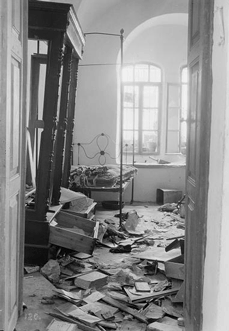
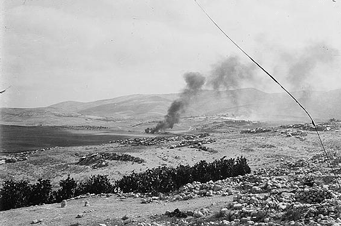
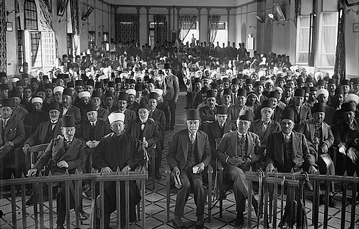
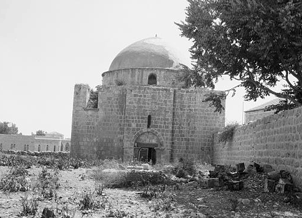
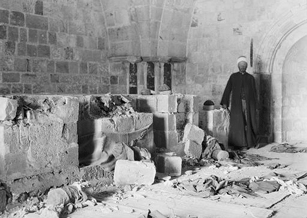
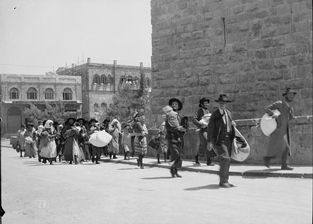
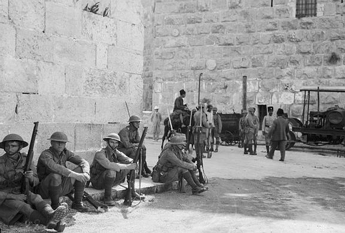
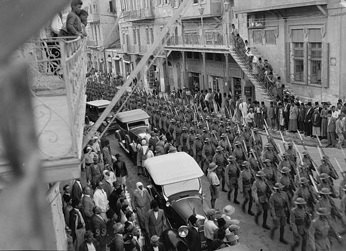
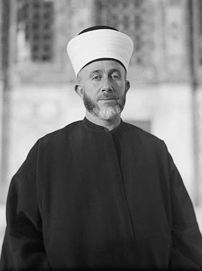
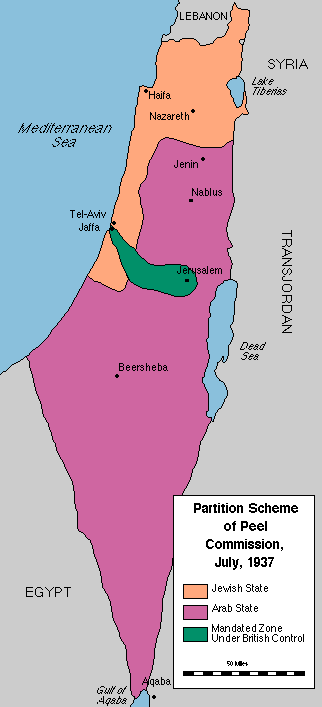
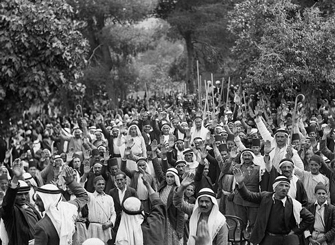
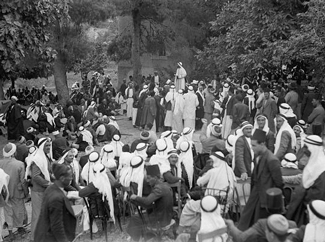
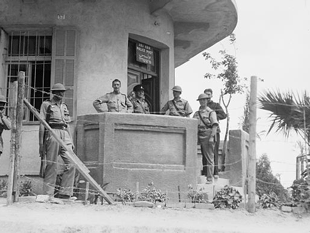
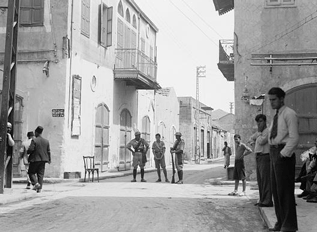
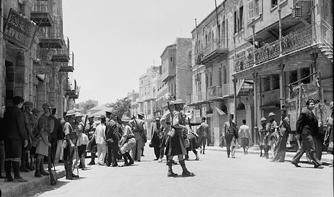
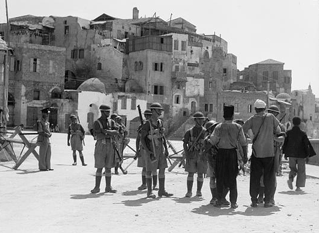
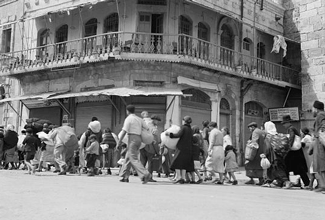
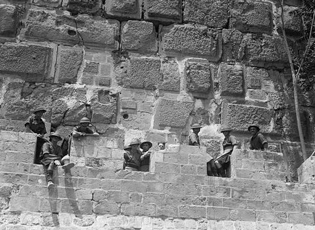
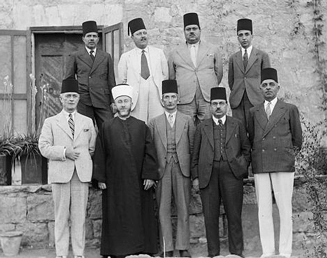
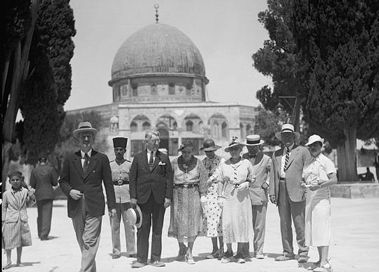
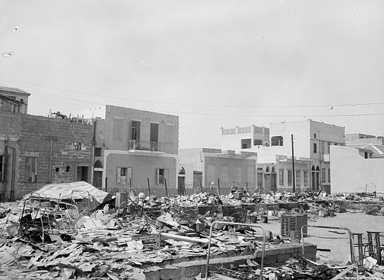

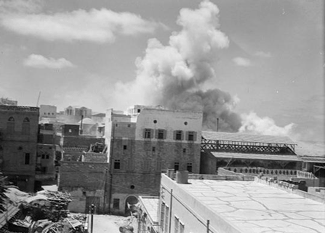
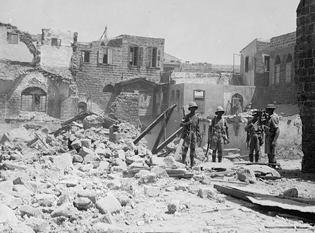
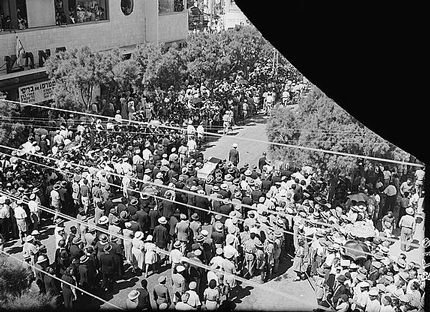
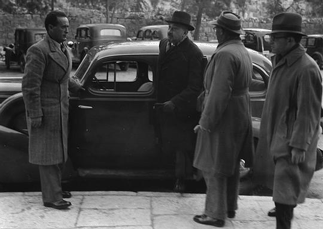
No comments:
Post a Comment